A Sportsman’s Life: The Collected Columns of Bill Heavey

The Late, Late Show
There's a fine line between dedicated and unhinged.
February, 2003 Late January, 12 degrees and falling, the northwest wind hurrying a red sun toward its slot in the horizon. Seated in a gently rocking tree stand 70 yards back from a field of winter wheat, I am exploring that fine line between hunting really hard and suicide by hypothermia. A hunter may take either a buck or doe during the late bow season in my state, and any guy with half a brain should be happy with either by this point in the game. Me, I'm holding out for a buck, a good one. Might as well go down swinging. In a feeble attempt to stave off the cold, I've shoved hand warmers inside my gloves and toe warmers into my boots. I've been trying to ignore the shivers by reading the plastic wrappers they come in. These marvels of modern technology consist of stuff that has been around since the wheel: iron, water, activated carbon, and salt. In French, the other language on the wrapper, this is translated as fer, eau, carbone active, et sel. Nevertheless, the package contains more warnings than a new chain saw. The warmers are not to be applied directly to bare skin, desensitized skin, on the instep (cou-de-pied), ankle (la cheville), or arch (l'arche du pied). Do not use them when sleeping. Children, the elderly, and some disabled people should be supervised when using the product. Don't put them on frostbite. Don't puncture them. If you do, resist the temptation to place the contents in your eyes or mouth. Don't swallow them. If you do, consult a physician. Fast. In direct violation of the safety instructions I have duct-taped a fifth and larger warmer directly against my skull beneath two hats. I have been doing this for years, no doubt slowly cooking my brain. This explains why I'm (a) bowhunting in late January, and (b) holding out for a decent buck. The strange fact is that I like the late season, cold and all. I like it because the smart hunters-"those smug guys diligent enough to scout the preseason and disciplined enough to avoid overhunting prime stands-"have tagged out. That leaves the woods to guys like me: the obsessed, the unhinged, the ones who don't know when to quit. There is a strange satisfaction in this kind of hunting. If you get a deer, the victory is that much sweeter. If not, it damn sure wasn't for lack of trying. At 5:22, i spot a doe 100 yards out as she picks her way toward the field. As long as she's moving, I can see her. The moment she stops, she disappears into the landscape. Despite years of seeing it, the trick still fascinates. At 5:34, I register a little 4-pointer in the distance. His unusually white antlers almost glow in the fading light. I don't want to shoot him; I want to warn him. I want to tell him to muddy those stickers up if he hopes to make it through another year. At 5:52, legal light ends, but something keeps me on stand, watching. Then he comes, the big shape ghosting in from upwind. It's too dark to read my watch, let alone count tines, but I know this is the one, know it as surely as if I were seeing him under a spotlight on an empty stage. I know it because my heart is booming and the heart does not lie on late January afternoons when it's 12 degrees out. The world stops as he passes soundlessly beneath my stand, as he enters the dark field to feed. Suddenly, for the first time all day, I notice that I'm warm all over. And a strange rapture courses through me, every molecule in my hunter's blood suddenly alive and singing. Field & Stream Online Editors
There's a fine line between dedicated and unhinged.
February, 2003 Late January, 12 degrees and falling, the northwest wind hurrying a red sun toward its slot in the horizon. Seated in a gently rocking tree stand 70 yards back from a field of winter wheat, I am exploring that fine line between hunting really hard and suicide by hypothermia. A hunter may take either a buck or doe during the late bow season in my state, and any guy with half a brain should be happy with either by this point in the game. Me, I'm holding out for a buck, a good one. Might as well go down swinging. In a feeble attempt to stave off the cold, I've shoved hand warmers inside my gloves and toe warmers into my boots. I've been trying to ignore the shivers by reading the plastic wrappers they come in. These marvels of modern technology consist of stuff that has been around since the wheel: iron, water, activated carbon, and salt. In French, the other language on the wrapper, this is translated as fer, eau, carbone active, et sel. Nevertheless, the package contains more warnings than a new chain saw. The warmers are not to be applied directly to bare skin, desensitized skin, on the instep (cou-de-pied), ankle (la cheville), or arch (l'arche du pied). Do not use them when sleeping. Children, the elderly, and some disabled people should be supervised when using the product. Don't put them on frostbite. Don't puncture them. If you do, resist the temptation to place the contents in your eyes or mouth. Don't swallow them. If you do, consult a physician. Fast. In direct violation of the safety instructions I have duct-taped a fifth and larger warmer directly against my skull beneath two hats. I have been doing this for years, no doubt slowly cooking my brain. This explains why I'm (a) bowhunting in late January, and (b) holding out for a decent buck. The strange fact is that I like the late season, cold and all. I like it because the smart hunters-"those smug guys diligent enough to scout the preseason and disciplined enough to avoid overhunting prime stands-"have tagged out. That leaves the woods to guys like me: the obsessed, the unhinged, the ones who don't know when to quit. There is a strange satisfaction in this kind of hunting. If you get a deer, the victory is that much sweeter. If not, it damn sure wasn't for lack of trying. At 5:22, i spot a doe 100 yards out as she picks her way toward the field. As long as she's moving, I can see her. The moment she stops, she disappears into the landscape. Despite years of seeing it, the trick still fascinates. At 5:34, I register a little 4-pointer in the distance. His unusually white antlers almost glow in the fading light. I don't want to shoot him; I want to warn him. I want to tell him to muddy those stickers up if he hopes to make it through another year. At 5:52, legal light ends, but something keeps me on stand, watching. Then he comes, the big shape ghosting in from upwind. It's too dark to read my watch, let alone count tines, but I know this is the one, know it as surely as if I were seeing him under a spotlight on an empty stage. I know it because my heart is booming and the heart does not lie on late January afternoons when it's 12 degrees out. The world stops as he passes soundlessly beneath my stand, as he enters the dark field to feed. Suddenly, for the first time all day, I notice that I'm warm all over. And a strange rapture courses through me, every molecule in my hunter's blood suddenly alive and singing. Field & Stream Online Editors

Sometimes the problem with dream trips is the reality.
March, 2003 In a moment of acute midlife irresponsibility a few months back, I decided to roll the dice, plunking down four grand I didn’t actually have to chase giant peacock bass in Brazil. Peacocks, native to the Amazon Basin, have a lifelong case of road rage and gleefully destroy anything that gets in their way, big topwater lures included. They are bass in the same way that Komodo dragons are lizards. More than one Yankee angler has gone home minus a thumb after trying to lip a fish with razors in its mouth. My plan was to go to a fishing camp on the Rio Negro, about 1,000 miles upstream of Bel¿¿m, at the mouth of the Amazon. This is where the current world-record speckled peacock (largest of the nine known species), a 27-pounder, came from. All was going well until just before my last connection, when I was poleaxed by a combination of nausea, dizziness, diarrhea, fever, chills, and vomiting. I also didn’t feel very good. I must have hailed a taxi before passing out, because I woke sweaty and feverish at the Hilton in Bel¿¿m. Flexibility is the key to successful foreign travel. I immediately decided against fishing in favor of a more important mission: attaining the minibar at the foot of the bed before I died. Everything that was crucial to my survival was inside that magic box, including potable water to combat the dehydration that had made me delirious and transformed my tongue into a twice-baked potato; little boxes of fruit juice to replace the calories that had been rocketing out of my body; and Chivas Regal miniatures to muffle the auto-body shop that had taken up residence behind my forehead. In a single, athletic move, I lurched forward and fell face first into the shag carpet at the foot of the bed. It was soft and, I assume, synthetic, since it seemed to wick the sweat away from my skin. At eye level, the tangled fibers turned into an aerial view of the rain forest. In the ensuing fever dream, I found myself floating, looking down into dense jungles that had never seen an axe. Green and yellow birds did a stately, hopping dance by bright rivers. Monkeys solemnly inspected fruit in the tops of trees. Jaguars traced ancient paths known only to their race. Somewhere in the wispy clouds, Sting was plucking a guitar and singing sorrowfully in Portuguese. It was then that I understood that the rain forest was truly the lungs of the world. Or at least of this particular shag carpet. The hotel doctor who saw me was a very wise man with a long face. He listened to my chest, told me I was indeed sick, and left a $100 charge on my room bill. Two days later, recovered enough to fly home, I sat for an hour in the stifling heat of Bel¿¿m by the docks of the river, watching three little boys fishing in the muddy water. Their technique was to cram a crust of bread into a wine bottle, tie it to some heavy mono, and cast out. Five minutes later, they would dive into the river and follow the lines down to their bottles, trapping the minnows inside with the palm of a hand. They pantomimed to me that they would eat the fish, bones and all, in soups their mothers would make that evening. So that was my South American adventure: four grand and 6,000 miles to sit on a bench and watch kids catch minnows. On the other hand, I’d cheated death, reached the minibar under extreme conditions, and learned a new way to fish. And I’d been reminded of a lesson I seem destined to relearn every few years: When you roll the dice on a dream trip, make sure you’ve got a bottle of Kaopectate within easy reach. Field & Stream Online Editors
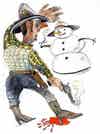
It’s awards time! But being nominated isn’t necessarily an honor.
April, 2003 Ignore that harebrained Gregorian calendar the bank sends you each year in exchange for raising its ATM fees to roughly the amount you were planning to withdraw in the first place. For one thing, that method of tracking the year is named after an Italian guy who was pope nearly 500 years ago and whose real name was Ugo Buoncompagni, not Greg. For another, any outdoorsman worth his grunt tube knows that right now, after the last days of hunting season have wound down and just before fishing cranks up, is when the new year really begins. But before embarking on fresh adventures in pursuit of fin, feather, and antler, let us pause to salute those who screwed up so royally last time around they make the rest of us look as savvy as the guy who invented the corn dog. Can’t Fool Mother Nature Award.
According to KIFI-TV in eastern Idaho, an animal-rights activist calling himself Jesshua Amun was badly mauled by a grizzly bear outside of Yellowstone National Park in August. Amun was with three members of the Buffalo Field Campaign, a group outraged by the killing of bison that wander outside the park, who were charged by a female grizzly with cubs while they were tracking a bull bison. All four ran, but it was Amun the bear chose for a mauling that required hundreds of stitches to repair. A photo of the victim’s badly chewed mug was sent out over the wire services to newspapers. Shortly afterward, Ohio police asked Idaho authorities to arrest him. Turns out his real name is Jeffrey Scheu. And the mama grizzly may have sniffed him out for what police officials say he truly was: a deadbeat dad. Scheu subsequently pleaded guilty to three counts of failure to pay child support. Honesty Is the Worst Policy Award.
Bob Bowling of Willard, Kentucky, who accidentally shot himself in his right upper thigh last winter, initially told police that his holstered handgun had discharged when he sat down, according to the Ashland Daily Independent. Later, in a moment of honesty he probably now regrets, Bowling admitted that he’d plugged himself while practicing quick-draw moves on a snowman in his backyard. The snowman was not charged and has since rejoined the water table. The Poetic Justice Award.
This one has been making the rounds on the Internet and is difficult to confirm, but it has that Homo sapient ring of truth to it. As the story goes, two Michigan duck hunters drove out onto a frozen lake late in the season with everything they needed for a successful hunt: a brand-new $42,500 Lincoln Navigator, shotguns, a Labrador retriever, and dynamite to create a honey hole. They lit the 40-second fuse on the explosive and threw it as far away as they could, whereupon the Lab eagerly bounded off to fetch the smoking red stick. Seeing the dog start on his return trip and suddenly fearing for their lives, one of the pair fired at man’s best friend, stunning but not stopping him. The guy fired again, and the dog, now panicked, did the only sensible thing: It dove underneath the new SUV for cover. Moments later, the Lab went to heaven and the SUV went to the bottom of the lake. Fortunately, the tale has a happy ending. The owner of the vehicle was told by his insurance company that his policy did not cover the illegal use of explosives. The $560 monthly payments would remain in effect until the purchase price was met. These tales will bring me immeasurable comfort during the coming months as I make precision casts into the tops of trees, hike 3 miles in darkness to a deer stand without the release for my bow, or step into waist-deep potholes wearing hip waders. I may not be the sharpest knife in the drawer, but there are guys out there who make me look like a razor blade. Field & Stream Online Editors
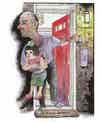
Fatherhood: the end of fishing as we know it
June, 2003 The instant the baby-sitter shows up, all you’re going to see of me is taillights. I’ve got an accomplice, Jim, idling at the nearest ramp in a bass boat with a new sonar unit. I’ve got six rods ready and stashed in my car, along with some heavy bass ordnance from the new Cabela’s catalog: Recoil Grubs made of a miracle plastic that stretches to 15 times its original size so that a 4-inch bait doubles as a cargo tie-down in emergencies. Yamamoto Senkos, those pricey little jerkbaits packed with so much salt that you’re tempted to snack on them yourself when the fishing’s slow. The Yo-Zuri Hardcore Shad with the tungsten weight that slides to the tail of the lure for long casts and then falls into the belly, where it is secured by a tiny trapdoor during the retrieve. This stuff is burning a hole in my tackle bag. I have not been fishing for an entire week, ever since my wife went to Chicago on a business trip. But today the dry spell ends. Faith, the high school girl up the street, has agreed to baby-sit. Sensing my desperation, she has also jacked her rate up to six bucks an hour. Fine. If I ignore the speed limit, I can be waterborne in 16 minutes. But the green flag doesn’t drop until Faith shows. Meanwhile, Emma and I are watching The Lion King on video for the 6,000th time. At 3, Emma lives in a blissfully simple world. The first thing she wants upon waking is a bottle of milk. The second is The Lion King. Right now, we’re at Emma’s absolute favorite part. Timon, the fast-talking meerkat, and Pumbaa, his dim-witted but lovable sidekick (a warthog with a flatulence problem), have just encountered Simba, the runaway lion cub who wrongly believes he is responsible for his father’s death. Meerkat and warthog welcome lion into their carefree outcast existence with the insanely catchy song that (after much repetition) winds up: It’s our problem-free phi-los-o-phy. Hakuna Matata! Emma squeals, “Kuna Tata!-¿ and I check my watch. Faith is now 11 minutes overdue. I look around the room for something to place between my jaws in case I start to scream involuntarily. Things were not always thus. There was a time just a few years ago when I fished whenever I wanted. I generally chose those times by the positions of the moon and sun, and by relative barometric pressure. I liked dawn or dusk, a low (or at least falling) barometer, and the moon either directly underfoot or overhead. As much as possible, I avoided weekends, which is when people who work for a living fish. I was, to put it bluntly, an unbearably smug bass fisherman. Fatherhood has taken me down a few pegs. These days, I take my fishing whenever I can get it, and I take it humbly. The phone rings. It’s Faith. She says she has a sore throat and can’t make it. End of story. I call Jim on his cell. “I got nuked,-¿ I tell him. “Baby-sitter’s sick.-¿ In the background I hear the sounds of truck doors slamming, the eager voices of anglers loading up their gear, the bittersweet Doppler whine of a boat engine as it heads off into the distance toward fish. Meanwhile, Emma is rewinding the tape so she can watch her favorite scene again. “I feel your pain, bud,-¿ Jim says, and I know it’s not just a Bill Clinton imitation. He’s a father, too. His daughter is now 16. He once again fishes at will. “Next time,-¿ he tells me. “Yeah,-¿ I say. “Hakuna matata.-¿ He laughs. “Oh, man. The Lion King. That sure takes me back. You know what? I actually got to where I liked that movie.-¿ I quietly hang up the phone without saying another word. Jim and I are no longer friends. Field & Stream Online Editors
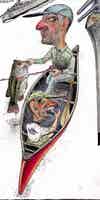
Catch-and-release-“or else
July, 2003 The fish strained left, ran right, jumped, and tried to shake the hook, then darted under the canoe to sulk. It made a last furious run, trying to tunnel its way back to the bottom. Then it was over, and I was proudly hoisting my prize for a quick photograph. Greg, looking through the camera, shook his head and frowned. “This isn’t working for me,-¿ he said. “We’ve got you, a bass, and a couple of guards with M-16s in the background. It looks like you’re fishing in a catch-and-release-or-we-shoot zone. Try turning the other way.-¿ I turned, held the bass up, and smiled at the camera again. “Unh-unh. Those surveillance cameras look like they’re growing out of your head. Hang on.-¿ He put down the camera, picked up his paddle, and quickly spun the canoe around 180 degrees. Clearly bored with this process, the bass in question-“a solid 41/2-pounder with a Rapala Jointed Shad Rap (fire crawdad pattern) hanging from its lip-“flapped its tail. It was one of those I-hate-to-intrude-but-I’m-getting-a-little-short-of-breath-here shakes. I unhooked the biggest bass of the summer so far, lowered it back into the water, and watched it dart, unrecorded, back into the depths. Welcome to Code Orange fishing. It’s not that Greg and I are national security-“site junkies. It’s just that the bassiest place we know of at the moment is a wall along the Potomac River that borders Fort Lesley McNair, a secure facility that is part of the Military District of Washington and the location of high-value targets like the National Defense University. In order to access this honey hole by canoe, you launch from behind a green dumpster in back of the U.S. Coast Guard Headquarters, another secure site, which is ringed by concrete barriers. If you smile at the cops as if you do this all the time, they’ll generally leave you alone. I don’t think they have any specific guidelines for dealing with canoe traffic. Paddling into position, we were nearly swamped by the wake of the 87-foot cutter, Ibis, which was in the process of anchoring in such a way that its gun covered anything moving in the channel. Two orange-vested cops in a 25-foot inflatable with twin 200-horsepower Yamahas grumbling on the stern idled by and gave us the once-over. As we approached the wall, the pair of guards with M-16s on their shoulders nodded, as if to say, don’t plan on getting back any lures that land on government property. The tide was coming in and pushed us steadily up the channel past poles holding hooded surveillance cameras. Pretty soon we were approaching a buoy marking an underground cable, a place that generally holds fish. Just then, one of the guards walked over and announced, “Gentlemen, I’m going to have to ask you to keep at least 30 meters away from that buoy.-¿ We said that wouldn’t be a problem. He went back to his buddy, and we let the current push us away. Then the other one came over. “That stuff that guy just told you? I’m going to have to ask you to comply to that right now.-¿ We pointed out that the current was accomplishing this fairly quickly. “Yeah, but you’re not allowed on this side of the buoy at all. You have to stay at least 30 meters away on the downstream side.-¿ I looked at Greg, who has authority issues under the best of circumstances. “Don’t say anything, dummy,-¿ I hissed. “I’ve got to pick up the baby at five, and I can’t do it from some damn brig.-¿ He put his rod down to pick up a paddle, and we repositioned. A few minutes later, I caught the big bass. In the next two hours, we boated three more smaller ones and two channel cats-“not a bad afternoon’s fishing. “So,-¿ Greg said, as we paddled back toward the dumpster-cum-takeout point, “you want to come back Tuesday?-¿ “Yeah,-¿ I said, smiling and waving to a coastguardsman wiping down the gun mount Field & Stream Online Editors

Sweat a lot. Seem busy. Do nothing. Things get kind of slow in my neck of the woods around now. Even the bass get bored. Average daily highs in the slow-roast range have pushed the fish into the deepest holes they can find. Slowly finning the coolest water for miles, a pod of big ones watches your lure fall and amuses themselves by competing to be the first to call out the page of the Bass Pro Shops catalog on which it appears. Meanwhile, 20 feet up, we diehards fish until we’re dehydrated, delaminated, and decisively skunked. Back at the dock, we swear on our Power Baits that we will never again go fishing in August. A few days later we’re back at it, showing just how severe certain learning disabilities can be. My summer has been further enhanced by a decision last March to enter the unofficial neighborhood lawn contest. That was the month I applied an entire bag of fertilizer (sufficient for 15,000 square feet of grass) to 6,000 square feet of earth. The result is a crop of crabgrass that is growing like hydrilla. If I miss a week with the mower, the Iraqi National Congress could be meeting out back and I wouldn’t know it. I thought I was the only one having a slow summer until I read an Associated Press article about the customers of the Sky Port diner near Schenectady, New York. They recently noticed that Dick, the 17-year-old goldfish in the aquarium behind the counter, was having trouble staying upright. Some people would say, “Well, I’m terribly sorry to hear that, but 17 is really pretty old for a goldfish.-¿ Not these folks. They got involved. One of the regulars prevailed upon his daughter, who is studying to be a veterinarian, to research fish ailments. She decided that Dick’s symptoms pointed toward a swim-bladder problem, which she treated by hand-feeding him cooked peas three times a day. Other customers decided that nutritional support was a good first step but no substitute for a comprehensive course of therapy. They got together and built Dick a fish sling so he could recuperate in an upright position. They constructed it out of what any enterprising guy would use: fishing bobbers, soda straws, string, and gauze. Patty Sherman, who co-owns the diner, says customers like to relax at the counter and watch Dick in his homemade sling. Those are the kind of people who understand that the real purpose of summer is not to do very much of anything. It’s hard to imagine when the shingles on your roof are curling in the heat, but bow season starts in less than two months. Every article you’ve ever read about preparing for it says you must practice shooting in the same clothes you will wear when hunting. This is, of course, ridiculous. I usually hunt in a full Scent-Lok suit, including head cover. Wear that outside on a 95-degree day and you risk two disasters. One is death by heatstroke. The other is ruined hunting gear. The best charcoal-activated suit can only absorb so much body odor over its working life before it throws in the towel. Nonetheless, I pride myself on having developed an exacting practice routine. I figure that you’re probably only going to get one shot at a trophy deer, and it’s not going to be when your muscles are warmed up from shooting. So that’s how you practice. You march out with a single arrow to a spot in the backyard about 40 yards from your McKenzie deer, draw back, and shoot. If it’s a good shot, you go back inside satisfied. If it’s a bad shot, you go back inside anyway and mull over what you did wrong for an hour or so, then go shoot another arrow. It’s a demanding regimen, but I follow it religiously right up until I miss. Then I say to hell with it, get about eight arrows, and keep shooting until I’m damn sure my target deer no longer presents a threat to anybody in the neighborhood. A rigorous practice routine makes good sense during rigorous times. Summer isn’t one of them Field & Stream Online Editors

Stay tuned for more (yawn) bass action
September, 2003 Nobody was home to stop me last Saturday, so I watched bass shows on cable television for six hours. That’s right, six straight hours of rod-bending, line-stretching, heart-pounding action. And when it was all over, I was a new man. I had learned about structure fishing and finesse angling from the experts. I had learned about life on the tournament trail. And every six minutes I had learned about the recent advances in hair replacement and diet supplements that are so important to successful bass fishing. Perhaps the single most important thing I learned is that, on average, it takes a full 40 hours of raw sewage-“sorry, footage-“to make a half-hour program. So when the guy on camera finally catches a fish, it unhinges him a little, causing him to repeat what he’s saying at least three times. Let me demonstrate with actual quotes (names omitted to protect the guilty): “Good fish. Nice fish. Healthy fish. And fat. That is one fat fish.-¿ “That’s a gorgeous fish. Just a gorgeous, gorgeous fish.-¿ “Oh, man. He just inhaled that spinnerbait. He crushed it. He hammered that thing.-¿ I also learned that there is almost nothing so obvious that you can’t say it on bass television. Let me elaborate with more genuine quotes. These are things people actually said. I mean verbally, using their lips: “If a fish hits your bait right under the boat, you may be too close to the structure. You need to back up.-¿ “If they’re not shallow, don’t be afraid to look deep.-¿ “Remember, the bass can be in, over, or just off the weedbeds. Or any other kind of structure.-¿ “The places where the lines get closer together on your topo maps, those are the places where it’s steep. That’s where your dropoffs tend to be.-¿ Sometimes the obviousness transcends itself and approaches a kind of bassing epiphany, a Zen moment: “Those big dudes are in here to feed. And believe me, if they want it, they’ll come get it.-¿ “The Classic is hard to win but very easy to lose.-¿ “You’ve got to move, move, move. And when you find the fish, they’re there.-¿ We’ll be right back with more eye-popping action. But first, lean in a little, so I can shout the following question directly into your ear. WHEN IS A DIET PILL WORTH $153 A BOTTLE? The answer is; When it releases tiny army men directly into your bloodstream to take on fat cells in hand-to-hand combat. Lardbegone is much too expensive and much too powerful for the casual dieter who wants to shed 5 or 10 “vanity-¿ pounds. But if you’re so fat that people think you’re backing up when your beeper goes off, Lardbegone might be for you. A number of anglers have expressed concern about what bass fishing is “all about.-¿ Fortunately, the experts are only too happy to share their wisdom: “It all boils down to execution. The final element in your success equation is execution.-¿ “It’s all about timing. You might not be here when they’re feeding. But if you come back in two hours, you’ll catch one every cast. So it’s all about timing. And about boat positioning. And banging that cover with your lure. That’s what it’s all about.-¿ Another thing I noticed is that many television hosts like to kiss the bass they catch. I don’t know who started this, but it has become epidemic. And it has to be hurting the catch-and-release survival rate. How strong do you think your will to live would be if the last thing you saw before being set free was an extreme close-up of Woo Daves’ lips? My favorite moment of the whole day came when Babe Winkelman and a friend were banging one largemouth after another on downed timber off a point in a Wisconsin lake. “Babe,-¿ asked the friend, dutifully setting up his host for a sage observation, “does that current going through here have anything to Field & Stream Online Editors
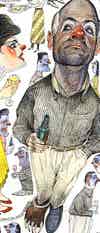
Surviving the switch from camo to khakis
October, 2003 I went to a cocktail party the other night, an activity I don’t particularly recommend. For certain men, temporary incarceration in a small space with strangers pretending to have fun ranks right up there with a tax audit. I sometimes doubt if parties would exist at all if it weren’t for booze, since the very act of making small talk with people you’ve never met is so unnatural that you need to be slightly impaired to do it gracefully. But Jane says it’s good for me to get out and mingle, so, like a chained bear, several times a year I am dragged out for socialization. This particular party took place during the height of the pre-rut, and I’d been in the woods until the end of legal light, when I found myself pinned in my tree stand by a doe with two yearlings in tow. Not wanting to burn out the stand by announcing a human presence, I let my bow down on the rope and banged it softly in the leaves a few times. They didn’t snort, just stiffened up and moved slowly away. Satisfied, I descended and crept silently out of the darkening woods. I raced across town to the address Jane had given me, crouched down in the shadows between my car and a hedge, and changed into khakis, a button-down shirt, and loafers. Immediately upon entering, I identified this as a classic disaster-in-the-making: many people, bright lights, the din of forced merriment. Also, I noticed that all the other men not wearing ties had on shirts that buttoned all the way up to the neck. Where I grew up, wearing a shirt buttoned up to the neck without a tie sent out an urgent nonverbal signal: Please beat me up. Evidently this has changed, because none of the men seemed the least bit embarrassed by how they were dressed. I grabbed a beer and saw to my chagrin that Jane was engaged in a lively conversation on the far side of the room. Like many women, my wife finds talking to people she has never met invigorating. I sat down on one end of a sofa and tried hard to make myself invisible. But it didn’t work, and I soon found myself face to face with a brightly smiling woman wearing a turquoise necklace. She introduced herself, saying she taught mythology at the local university. “I understand from your wife that you’re a writer,-¿ she said. “What were you working on today?-¿ I told her that I hadn’t been writing at all today, I’d been in the woods hunting deer. The smile dimmed a few watts, and I could see the wheels turning inside her head. She was having what psychologists call an “Aha!-¿ moment: She’d heard of people who hunted deer, and now she was actually talking to one. “And what do you use,-¿ she asked, “some kind of rifle?-¿ I told her that at this time of year, I hunted with a bow. This completely flummoxed her. “Like a Robin Hood bow?-¿ she asked. Sort of, I told her. A compound has wheels on it and is a bit more powerful and more compact than Robin Hood’s. “Is it electric?-¿ she asked. No, I explained, you pull the string back with your arm just like other bows. I was trying to be helpful, just as she was trying to be cordial, but I was beginning to wish I’d said I was in software. Just then, she looked away for a moment, pursed her lips, and turned back to me. “I suppose you find it hard to explain why you hunt to people who don’t,-¿ she said. I do indeed, I told her. “I read somewhere-“I think it was an American Indian elder who said it-“that whatever a man hunts, he’s ultimately hunting himself,-¿ she said. “Is that true? Can you explain that to me?-¿ I said I thought it was true, though I didn’t fully understand it. I told her that for some men, hunting is a kind of discipline, a way of peeling back the layers of mistaken identity that daily life piles up on you. It’s a way of discovering who you are, or maybe remembering who you really were before modern life mixed up who you were as a m Field & Stream Online Editors
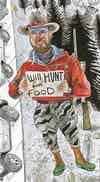
Your best deer could be the one you don’t keep
November, 2003 “We’re always on the lookout for meat,-¿ says Laura Rhea, president of the Arkansas Rice Depot, a food bank serving 300 church pantries across the state. She says she can usually get canned goods, grains, and bread. She can solicit cheese, produce, and sometimes a little chicken from a processor, especially around the holidays. “But meat is like gold to food banks. We can’t ever get enough. And venison is just wonderful meat, lean and healthy. We put it in soups, stews, and chili. I’m sure that if more hunters knew just how much difference the gift of a single deer makes, we’d have a lot more venison showing up at our door.-¿ Arkansas, like the rest of the country, has been experiencing significantly more hunger in the past year, mostly due to rising unemployment and the uncertain economy. Rhea (pronounced “Ray-¿) says that she’s seeing more and more people who are doing everything right-“working hard and playing by the rules and trying to pay their bills-“who just can’t make ends meet. There was a time not long ago when just about anybody in Arkansas who worked a full-time job could get by, Rhea says. They might not be comfortable, but most months they’d be able to feed and clothe their kids, make their rent, and hold on to a clunker car. That’s not the case anymore. The businesses they’re working for can no longer afford to offer health insurance. If they do, many workers can’t meet the copayment. “So you have something new: a whole class of young families whose food budget for the month gets wiped out if their baby gets pinkeye or strep throat. And you know what I’m thinking? I’m thinking that 20 years ago that would have been me.-¿ She tells me that there are 46,000 children in the state who are being raised in households headed by a grandparent, most often a grandmother who didn’t volunteer for the job. But the mothers are sometimes children themselves, barely into their teens. So the grandmothers or great-grandmothers take them in. These women tend to be on fixed incomes, so they are forced to play a cruel game every month: The options are food, rent, or medication; pick any two. Rhea tells me about elderly couples in which the man used to hunt but is now too feeble to get around-“and how the gift of wild meat brings back memories of a time when they were younger and he would drag home a deer that would feed them for the entire winter. She tells me how her organization discovered more than 15,000 children last year who weren’t getting enough to eat to perform adequately in school. And that was in just a fraction of the state’s schools, which means those 15,000 kids are just the tip of the iceberg. She tells me that school nurses in Arkansas have learned that when a child asks to leave class because of a stomachache, it pays to ask that child if she has eaten in the past 24 hours. Because increasingly, a child who complains of an upset stomach is actually talking about an empty one. Rhea knows a primary-school teacher who has taught in Arkansas for 30 years who no longer introduces new material on Mondays until after the school-provided lunch, because a child who hasn’t eaten all weekend is incapable of concentrating. Recent research indicates that even mild undernutrition during critical periods in a child’s life affects brain development and stunts physical growth. “My experience with hunters in our state is that they’re good-hearted people,-¿ Rhea says. “It’s just that nobody has ever told them how much of a difference they can make by donating one deer. To have the joy of the hunt and then have the joy of filling somebody’s stomach, to me that’s got to be a satisfying hunt. I know life’s not fair. But it ought to be. For children, anyway.-¿ Field & Stream Online Editors
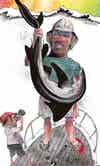
The worst outdoor moments of 2003
December 2003/January 2004 A guy I know actually did the following things this past year: The guy was me, a fellow with the physical and mental abilities of that noted outdoorsman, Elmer J. Fudd. The good news is that I am not alone. There are millions of us out there. And it’s time we stood up and said to the world, “Get used to it. We’re here, we’re inept, and we have no intention of changing anytime soon.-¿ To that end Field & Stream is inaugurating the Elmer Awards to celebrate those who allow millions of sportsmen to experience a feeling they would otherwise never know: smugness. This year’s entries include the government (surprise!), an angler who wishes he’d set his parking brake, and another who will now make sure that any shark he catches is definitely dead before posing with it. Who’s the winner of this year’s top Elmer Award? You be the judge. Your Government in Overreaction
When law enforcement officials received reports of a lone man firing shots from a long gun near Waseca, Minnesota, they evidently decided it was a good time to blow the annual budget. According to the Mankato Free Press, they closed off a mile-long stretch of Highway 13 and set up a command post. In case the guy also happened to be carrying nuclear weapons, they called in police officers from six counties and the Minnesota State Patrol, while a SWAT team from the South Central Drug Task Force searched nearby farm buildings. When those measures failed to turn up the suspect, a state police airplane was called in for aerial surveillance, as was a helicopter with infrared capability. When witnesses were interviewed a second time, a local man confessed that he had been walking along a ditch with a rifle, hunting groundhogs. The SWAT team drove the man home and searched all the structures on his property. In the end, no arrest was made. “You have to be prepared,-¿ said Waseca County Sheriff Timothy J. Dann. “We all worked surprisingly well together.-¿ Honey, I Shrunk the Kia
Steve Wagner just wanted to get a few minutes of fishing in on the way to work near Medford, Oregon, last April. A report by the Associated Press says he parked his blue Kia Sportage by the Rogue River and got out, then saw it start to roll toward the water. He tried to block the vehicle’s path, but realized he would be unable to stop it. Next he attempted to jump into the moving truck but had to bail out. Seconds later, the vehicle was sinking in 20 feet of water. Meanwhile, a call had come in to the Rogue River Rural Fire District reporting that a car with passengers inside was sinking near the dam. Chief Greg Winfrey raced to the scene and found Wagner, dry but dejected. Eventually, a diver attached towing cables to the SUV to pull it ashore, with Wagner’s fishing tackle bobbing around inside. “I’ll be in the book of dummies for eternity,-¿ Wagner predicted. “And my wife is definitely going to rescind my fishing privileges.-¿ Take the Picture Already
A Houston angler who had landed a 31/2-foot bull shark got a ride in a LifeFlight helicopter after the shark forcibly resented the invasion of his privacy. According to the Houston Chronicle, after landing the bull shark-“and evidently thinking it subdued-“the unidentified angler held the fish up for his friend to take a photo. The shark had other Field & Stream Online Editors
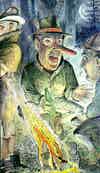
How to save face at the end of a busted season
February, 2004 So it’s finally over. You’ve either got a deer in the freezer or you don’t. You’re either doing the funky-chicken victory dance or deciding whether to throw your muzzleloader away outright or save it as a tomato stake. If you did get a deer-“and I mean any deer-“congratulations. You can sit back and tell the story over and over, until it takes on a life of its own. With each retelling, that deer will get bigger, the shot distance will increase, and the temperature outside will drop a bit more. By about May, you will have killed an animal the size of a moose during a blizzard by blowing a soda-straw wrapper at it from 400 yards. And you will half believe the lies coming out of your own mouth. This is hunting’s oldest tradition. In fact, linguists now conjecture that language first arose among hominids to fulfill that most fundamental of impulses: the need to lie. “Korg, this is no bull. I was so close when that mastodon farted that it blew all the hair on my forehead straight back.-¿ Any fool can cope with a punched tag. Venison, a rack to hang in the den-“these are child’s play. Nothing tests a hunter’s skill like failure. That’s when a real sportsman looks into the depths of his soul to see if he can summon up a level of creativity to which a successful hunter can only aspire: It’s time to come up with a good excuse. Let’s review the options. (1) Equipment Malfunction
Blaming bad gear is a perennial favorite. Psychologists (most of whom do not hunt) have a pejorative term for this. They call it blame shifting. I call it genius. Some samples: (2) Tremendous Size of the Animal
Success depends on the hunter seeming every bit as incredulous about the event as the listener. (3) Fear of Collateral Damage
Excuses like this portray you in a favorable light. (4) Too Wild to Be Contradicted
You need to say something so outrageous that your listener must either accept it at face value or call your bluff. This works best with guys who are smaller than you. Assume a somewhat belligerent tone, as if you’re tired of explaining the obvious. (5) Verbal Jujitsu
Use your listener’s own momentum against him in a way he doesn’t expect, causing him to fly out the window. Look to the left and right when he asks how you failed to get your deer, as if making sure nobody else can eavesdrop on the profound secret you’re about to reveal. Take a step Field & Stream Online Editors
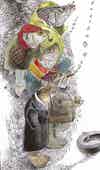
How anglers survive the agony of early spring
March, 2004 I have absolutely no business being here. None of us do. But on an unseasonably warm spring day like this one, when the sun decides to punch in for work for the first time in five months, it happens. You head out on some fool household errand and the next thing you know your car has driven you down to the river. And there, standing around the boathouse parking lot like convicts counting the days until their release, are half a dozen guys just like you. We are wearing pinstriped suits and plumber’s coveralls, leaning against waxed Suburbans and rusted panel trucks. And to a man we are tantalized and transfixed by that water sliding away just out of reach. It’s too soon. It’s still winter, season of extra layers, road salt, and despair. The water is too high, too muddy, and too cold. The first decent chance you have of something hitting a hook is two weeks away, minimum. We know this. We know it’s spring doing her annual striptease, that the universe is just yanking our chains. It’s just that we’re fishermen and we can’t help ourselves. So we’ve come to stare at the water as if we can speed up spring by telepathy. Here’s the drill where I live. The first perch don’t even think about migrating up the river until the water temperature hits 47, and they don’t start biting in earnest until it’s in the low to mid-50s. Then come the other migratory fish, the shad and herring. Only after that do the bass, crappies, and catfish turn on. It would be easier all around if fish lived in the air. Air’s a pushover. You throw it a little sunlight and it snuggles into your arms and coos, My place or yours? Even soil heats up fairly fast. A single warm day like this one has no problem coaxing the daffodils and forsythia into promiscuous behavior they’ll regret with tomorrow’s cold snap. But water remembers what Mama told her. She requires the prolonged application of warmth before she comes around. Danny, who has worked at the boathouse all his life, is busy with the annual repainting of the rowboats. Today he’s got three up on sawhorses, like giant turtles stranded on their backs in the sun. They’re 141/2 feet long and made of white oak. Some are 60 years old. They’ve been painted the same colors for as long as anyone can remember: brick red to the waterline, battleship gray beneath. “The color never changes, only what they call it,-¿ Danny says. “Most years it’s been -¿tile’ or -¿brick,’ sometimes -¿burnt brick.’ But lately they’ve been going a little overboard. Guess the marketing guys have to earn their pay. Last year it was -¿Hessian.’-¿ “What the heck is a Hessian?-¿ I ask. “I was wondering that, too. So I looked it up. It’s a German mercenary serving in the British forces during the American Revolution.-¿ I guess Danny’s got too much time on his hands, too. I ask what the color is this year. “-¿Matador,’-¿ he says. “No. Come on.-¿ He gestures to the can, and I bend over to look. Sure enough, matador. So now we’re waiting for the water to get warm enough for the running of the bulls. Fine. Whatever. Just hurry it up. By now, most of the stranded anglers have drifted over to watch Danny. We envy him. At least he’s got something to do with his hands. The group watches silently as a fat honeybee sets down on a section he has just painted. “The color,-¿ he murmurs to no one in particular. “They think it’s a flower.-¿ There is not much to be done about a honeybee who tries to suck nectar from a red rowboat, just as there isn’t much to be done about an angler who tries to pull fish from a too-cold river. Danny turns to load his brush, and when he looks back the bee is gone. “Oh, good,-¿ he says. “She got away.-¿ The phone rings and he answers it. “‘Bout two weeks,-¿ he says. “But keep checking with us because you never know when t Field & Stream Online Editors
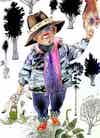
Who’s teaching your kids about the outdoors?
April, 2004 It all began innocently enough. Okay, maybe not so innocently. It was Sunday. My wife had just headed off to hunt the malls. The deal we have is that Jane takes care of Emma, our 31/2-year-old, when I hunt. And vice versa (Latin for “clean up the kitchen, too-¿) when she goes out. In short, I was looking at six hours of solo baby duty. I scanned the house for resources and found the usual suspects: videocassettes manufactured by the Walt Disney Corp. or its imitators, each of which Emma has seen 9,000 times. One of her current favorites is Spirit: Stallion of the Cimarron, in which a “wild-¿ horse declares his kinship to all living things, asserting that his kind had always belonged in the West and always would. The horses in Spirit speak only in voice-overs, but they have enormous eyebrows to mime their moral outrage at the white men who are building railroads through their lands. They have a burning desire-“not like real horses, which want merely to eat, sleep, and avoid feeding their foals to coyotes-“to run free, “like the wind in the buffalo grass.-¿ There is also The Fox and the Hound, in which all the animals of the forest-“carnivores included-“live in a kind of vegetarian paradise until unseen hunters orphan an adorable little fox named Todd. The one hunter who does appear in the movie has a big moustache made entirely of nose hair. At one point, we see him approach a posted fence that reads, NO HUNTING. GAME PRESERVE. His eyes narrow. “Well, now, we ain’t gonna do none o’ that, are we, Copper?-¿ he says sweetly to his dog. “We’re just gonna get us a no-good fox!-¿ It suddenly struck me that Emma’s hunting soul was in mortal danger. And that the only thing necessary for the triumph of evil in this world is for enough good men to allow Walt Disney to explain the outdoors to their children. “Monkey!-¿ I cried, “this is your lucky day. We’re going hunting!-¿ Emma didn’t know what the words meant, but she liked my enthusiasm. I checked the short-term survival kit: diapers, wipes, juice boxes, and cheese sticks. I strapped her in the baby seat. Off we roared to some deer woods I’d been meaning to scout. “Where going?-¿ Emma asked at one point. “Hunting!-¿ I said. “Hunting!-¿ Emma echoed. We were actually only going scouting, of course. But I didn’t want to confuse her with details. These particular woods were loaded with sign: old rubs and scrapes, fresh droppings, loads of trails. “Emma!-¿ I said. “Pay dirt! There are deer everywhere here!-¿ We started down a tunnel-like trail. Emma, at just under 30 pounds and just over 30 inches tall, is built for this. She sprinted down the tunnels, delighted at my inability to keep up. At a place where two trails crossed, I explained that this was a good spot to put a tree stand, so you could ambush the deer with a bow and arrow. “Like yours?-¿ she asked. Sure, I replied, only we’d have to get her a smaller bow and little arrows. She beamed. “Little arrows for me!-¿ We followed tracks. We practiced sneaking through the woods. Every so often, I would pretend to spot a deer running away and lift Emma up to look at it. She always saw it. Then she started seeing her own imaginary deer and pointing them out to me just as they faded into nothingness. Long story short, we had a blast. Best of all, she was hooked on hunting without seeing anything more than deer sign. Three hours later, when Mom came home, Emma and I were glued to a different kind of video: Whitetail Madness 5, featuring 13 hunts with bow and gun. Emma was transfixed. “Here comes the buck,-¿ she whispered as a big 12-pointer lumbered into range. I’d already gone online and ordered a Genesis bow, a wonderful invention that accommodates draw lengths from 15 to 30 inches and that can have its draw weight adjuste Field & Stream Online Editors

The one that never really got away
May, 2004 I had the dream again last night. The one that’s not really a dream at all but a memory so old and deeply fixed that it has moved into the gated subdivision of my brain where the dreams live. Now it comes and goes of its own volition and visits most often at this time of year, late spring, as if in response to the lengthening daylight. It comes in the early morning, in that twilight place where I forget whether I’m a grown man dreaming of his boyhood or a boy dreaming of becoming a man. It’s a gift when it comes, a reminder: Wake up and remember what’s important, because you aren’t going to be here nearly as long as you think. I am wading-“and now it comes to me that I was a boy when this happened, I had just gotten my driver’s license-“for smallmouth bass in a rocky pool in a long riffle on a big river. The sky is overcast and a damp wind bites through my sweatshirt and wet jeans. The pool might have been lifted from the pages of a book on smallmouth habitat-“narrow and deep at its head, where an arc of water leaps off a flat rock into a dark hole studded with boulders and gravel that gradually tails out to sand. It is all of 30 feet long and 10 feet across at its widest, but it is an entire universe. I begin probing with a spinning rod loaded with 6-pound mono. First I work it over with my go-to lure, a 4-inch white grub on a 1/16-ounce jighead. I swim, bounce, and deadstick it through the water. Nothing. Next I try a 21/2-inch floater-diver Rapala in Baby Bass, then a green crawdad crankbait. Zip. I have already fished the pool for too long. Any wise angler would rest it and return later. I am not that angler. I bear down that much harder, as if I can make a fish bite through sheer doggedness. I’m positive there are smallmouths in here, probably at least one respectable 2-pounder. How could there not be? It’s a presidential suite for brown bass, it has everything: current, shelter, shadows, a minibar stocked with minnows and crayfish, polished golf ball-“size gravel lining the Jacuzzi, a good-night hellgrammite on each pillow. I know there are fish here. I tie on a firetiger popper, a 3/8-ounce black spinnerbait. Every offering comes back unmolested. Finally, I retie the white grub for a couple of desperation casts before leaving. On the very first throw comes a hit and a tiny, frantic tugging. Great. My labors have finally paid off with a one-round battle in the junior bantamweight division. A baby smallmouth, all of 4 inches long, has my hook protruding from its mouth. The little guy has more guts than brains, having smacked a lure its own size. I can’t help but smile at how he fights. Nobody has told him he’s little. He’s game, slugging it out for all he’s worth, telegraphing tight little punches up my line. That’s when it happens. As I reel in the baitfish, a dark form suddenly appears beneath the water. It’s shaped like a mottled green football, only bigger, longer. The sighting is too quick to compute into pounds and inches. All I know is it’s huge-“far and away the biggest smallmouth I’ve ever seen. The shape swoops toward the struggling fish, and I am sure that it will take the smaller one, swallow my hook, and have nowhere to run in the pool. In just a few moments I will have both the fish and the story of a lifetime. Just as its gills flare to suck in the doomed fish, the football changes its mind, breaks off its attack, and-“now-you-see-me-now-you-don’t-“vanishes. I bring the fingerling in, stare at it momentarily, and let it go. It disappears, too. The whole encounter has taken about 15 seconds, and now I’m left staring into the empty pool, which has already stopped rippling, as if there never was a tiny fish, much less a monster. But my trembling hands tell a different story. Yes, I’m disappointed, frustrated, and heartsick. I’m a boy, after all, with Field & Stream Online Editors
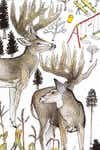
It was a trophy hotspot-“until I started hunting
June, 2004 It’s not that I was cocky at the start of last year’s deer season. It’s just that the only new equipment I expected to need was an Alum-i-Lite Game Cart from Cabela’s to help me get my trophies out of the woods and into the record books without hurting my back. My confidence came from having lucked into the mother of all honey holes behind the house of my new best friend, Jay Wheeler. Jay has the good sense to live where most monster deer can be found these days: the ‘burbs. His backyard is essentially a wooded funnel that connects a municipal park being denuded by protected deer to one of the last cornfields in the county. (Developers have long been eyeing that cornfield, reasoning that town houses are a better crop than corn, which does little to support the global market for Tyvek house wrap.) I spent much of last summer behind my binoculars watching deer move between the park and the corn. There were big tour groups of does, gangs of unruly 1- and 2-year-old bucks, and, just as the light gave out, a few old monsters. A couple of these looked to be genetic freaks, deer with swing sets exploding out of their skulls, antlers so heavy they had to hurt to lug around. Jay is a big dude who flew helicopters in Vietnam and usually has an unlit La Gloria Cubana cigar in his mouth. He runs a successful consulting company and has a lovely wife, Vicki. He is a guy with either a big heart or a small brain, because all he asked in return for hunting privileges was that I not park on the grass. In fact, I would happily have repainted his house, cleaned the gutters, and prepared his taxes in perpetuity. He can’t put his cars in the garage because both bays are crowded with racks from bucks he has taken from his backyard over the years. When I asked what time of year he starts hunting, he shrugged. “Oh, I usually just wait for the rut,-¿ he said. As bow season opened in mid-September, I parked my new folding deer carrier in Jay’s garage, half regretting that its shiny new finish would soon be marred by deer blood. Hunting season is both a wonderful and a dangerous time to be a freelance outdoor writer. It’s wonderful because, as master of your own time, you don’t need anyone’s permission to blow off work and go hunting. On the other hand, it’s dangerous because, as master of your own time, you don’t need anyone’s permission to blow off work and go hunting. After carefully reviewing my dwindling monetary resources, I did what any diehard hunter would do. I turned off the answering machine, changed my e-mail setting from available for hire to block anything that looks remotely business-related, and began hunting my brains out. I was there at dawn. I was there at dusk. And it wasn’t even October. I saw plenty of does and yearling bucks, but the big heads were scarce. Weeks later, in the honeyed light of a late-October afternoon, I finally drew on an 8-pointer standing broadside and oblivious as he fed on acorns 16 yards away. He was racked a tad wider than his ears, and anywhere else I’d have taken him in a heartbeat. But I wasn’t anywhere else. I was here. Tine Town. Antler Alley. The Funnel of Fun. A week later, one of those great heads appeared out of thin air 36 yards out, stretching his thick neck to sniff a rub. I slowly stood, drew, and tried to settle my 30-yard pin just over his back. Personally, I was fine. But my legs picked that moment to audition for the Lord of the Dance. The buck busted me in a heartbeat, then did that trick that only old survivors know: He didn’t wheel, snort, or jump. He simply dissolved, like the Cheshire Cat-“now-you-see-me-now-you-don’t-“leaving the outlines of his rack hanging in the air momentarily. I wished for nothing so much at that instant as the ability to kick my own butt. By November, I was in the full throes of my Field & Stream Online Editors
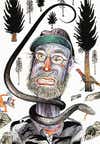
Gobblers, snakes, and “criminal-¿ behavior
August, 2004 In the lengthening light a dozen camo-clad guys sit downwind of a grill piled with rib eyes, sucking down the scented smoke and wishing the cook would call dinner. They’ve just rolled into camp to go turkey hunting tomorrow. The mood is boisterous. Old friends’ faces light up at the sight of one another. There are mock arguments, feigned indignities about whose pants no longer fit, who’s going gray faster. New hunters smile and listen hard, gauging their place in the pecking order. The stories, the glue that binds these men together (from teenagers to octogenarians, and there’s a woman in camp this time), are told and retold. It could be any camp in America, but it’s not. There’s something different here. The laughter comes from deeper in the gut. Handshakes have a way of turning into hugs. The natural tenderness that grown men feel for each other is closer to the surface here. Maybe it’s because every hunter came to camp in a wheelchair or leg braces or on crutches with an empty pants leg pinned back so they wouldn’t trip over it. Tail ends of stories flit through the smoke. “I’d found this dead black snake by the fire ring, and you know old Toby’s more afraid of snakes than he is of God himself. So I start hollering and shaking that snake all around like it was biting me. And instead of helping me, Toby takes off the other way with his power chair in overdrive-“just hauling. So I wing that snake after him. And damned if it doesn’t hit him right back of the head and wrap around his neck. And Toby’s just burning rubber and screaming, -¿Get it off! Get it off!’ And then he hits a root and falls over. Even on the way down, he’s screaming, -¿Snake! Snake! Snake!’-¿ There are guys laughing so hard they wipe tears away, but nobody’s laughing harder than Toby himself. Not bad for a guy who, after the car accident that took his legs and very nearly his life, fell into a depression so bleak his friends feared he might finish what the car accident had started. “I’m just so damn proud of Toby,-¿ one guy whispers to his neighbor. The neighbor smiles and nods a deep, knowing nod, almost a benediction. The next morning, I attach myself to Tommy Sorrels, a high school football star almost up until the moment the polio hit in 1955. Now his right leg is about as useful as socks on a rooster. But Sorrels, a proud man, has found a way to walk unaided by throwing his hip forward and trailing his bad leg after. All it takes is an unseen pebble to make him lose his balance and fall, but you wouldn’t want to be the one to tell him he ought to be doing it differently. He is one of the older hands at camp and somewhat famous for missing easy shots at turkeys. He takes it upon himself to make sure that everyone who comes to these hunts-“sponsored by Wheelin’ Sportsmen (www.wheelinsportsmen.org), a nonprofit group that partners with the National Wild Turkey Federation to put on free events for men and women with disabilities-“feels welcome and included. Each hunter is assigned a volunteer guide who helps him set up for turkeys. Joel Bennett, who works maintenance at the Savannah River Site (a nuclear facility) where the hunt is taking place and who has the look of a man born to wander the turkey woods, is partnered with Sorrels. Under a sky with pinprick stars, we cross a railroad track. Sorrels holds Bennett’s shoulder for support, while I bring up the rear, carrying decoys in a camo burlap tarp. Just over four hours later, around 10 o’clock, Sorrels misses a walking tom twice at 40 yards. “Oh, Lord,-¿ he says, grimacing. But it’s not the turkey he’s worried about. “They’re gonna fry me at court.-¿ Court, it turns out, is a ritual of this group. At lunch after the hunt, anyone who misses a bird is brought up on charges, with prosecuting and defense “attorneys.-¿ Sorrels is described Field & Stream Online Editors
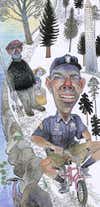
A look at fishing from the other side of the badge
September 2004 Not long ago, curious to see firsthand how local government wastes my tax dollars, I hitched a ride with the only game warden in the District of Columbia. Actually, any police officer can enforce game laws, but over the years it’s been Dennis Hance who has devoted himself to the task. If you call up the D.C. Police and ask to speak to a game warden, he’s the guy who answers. If President Bush decided to fish the Potomac without a license, Hance would be the guy to write him up. The department public-information officer had told me that due to liability issues, members of the press were prohibited from riding in the patrol boat. So when Hance invited me aboard, I slapped myself in the head, inducing a bout of temporary amnesia, and jumped in. Almost immediately, Hance, who bears a passing resemblance to Harrison Ford, pulled up to a guy fishing from shore. “See your fishing license, please?-¿ he asked pleasantly. The angler in question, like most inner-city residents, had the ability to detect hostility or condescension from a cop in parts-per-billion concentrations. He glared at Hance. “I know who you are,-¿ he muttered. “You gave me a hard time ’bout not having one last week.-¿ I stood there and tried to look like Hance’s tough but taciturn backup. The guy’s eyes swept over me, and I could sense him thinking, At least I don’t have to worry about the bald guy. “Then it ought to be easy for you to show it to me now,-¿ Hance said. The angler’s radar kept pinging away. But the strangest thing was happening. It was coming up blank. “Alright,-¿ he said. “I bought one after last time, but I ain’t got it on me.-¿ Hance ran a sniff test. He believed the guy. “Look. You know it’s a $50 fine. This is number two. I’m gonna cut you a break, okay? I’m gonna be back here and so are you, so let’s not make trouble for each other.-¿ And then the guy actually smiled. It wasn’t so much the words-“it was the vibe. Hance has something they don’t teach in the police academy: It’s called the common touch. And if you could bottle it, you could name your own price. “You’re alright, man,-¿ the guy said. This encounter, lasting all of one minute, blew me away. If it had been me, I’d have tried the soft approach, too. Only the moment it started to go south, I’d have turned Clint Eastwood on the guy: reached for my Glock, cuffed him, and demonstrated why nobody messes with Officer Heavey. “Easiest thing in the world to be a hard-ass,-¿ Hance told me. “The trick is to leave ’em smiling. That guy’ll remember me. And I bet he’ll have his license the next time I see him.-¿ Lest you think Hance is someone who takes the easy way out of a situation, you should know that he has been cited three times for risking his life while trying to save people who were drowning. What I like about the guy is that if he thinks you made an honest mistake, he’d rather help you than punish you. But if you’re deliberately breaking the law, don’t come crying for mercy. Once, he found two men in possession of 138 out-of-season rockfish. He wrote them up for the maximum, a total of $27,600. Later that day, we came across a man and his daughter pushing bicycles. His was loaded down with rods and a 5-gallon bucket full of herring and perch. These fish were legal, and the man had a license. “Do you have any more fish, sir?-¿ Hance asked. The fellow shook his head. Hance walked past him and pulled a stringer of carp and channel cats from beneath some bushes. “Sir, I saw you put these there not two minutes ago.-¿ The limit on channel cats is three a day, and the guy had six. Hance wrote the man up for three $100 violations. The little girl’s face was a stone mask the whole time. Hance finally leaned down and said, “If you don’t smile, I’m gonna have to ride your bike.-¿ T Field & Stream Online Editors
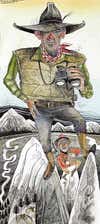
Exhausted, sore, cold, and strangely happy
October, 2004 Eating an early dinner in the cook tent the evening before firearms season opens, we hear distant bugling, and all nine of us hit the tent flap like frat boys who’ve just heard the words “free beer.-¿ Just 500 yards across the creek, grazing through a series of hillside parks, is the jackpot we’ve all gambled a few grand on: elk. There must be 40 of them-“great yellow-brown beasts with chocolate heads and chests. The scene is so stunning it looks fake, like a hokey wildlife painting. Meanwhile, all three guides produce binoculars out of thin air and start calling targets. “Legal bull. Looks like a 4×5, three o’clock low, right-hand clearing,-¿ says one. “Legal bull. Walking, ah, left to right. Lower end of the other clearing,-¿ calls another. “Legal bull, one o’clock high, half in the timber. Four points visible on the left side,-¿ reports the third. And then, like the finale of the Super Bowl halftime show, the herd bull, a shaggy 6×6 so big and distinct you can see him without optics, calmly steps out of the black timber and into the open for our viewing pleasure. “Dibs!-¿ I shout, almost before the thought is fully formed in my head. The guides, still glued to their glasses, all crack up. As if anything in this harsh country-“least of all a herd of bull elk that has probably made it through four hunting seasons-“plays by the rules of the schoolyard. “There are a hell of a lot of elk out here,-¿ the outfitter tells us that first night. “But there’s a hell of a lot of country, too. You need to think real hard about what kind of bull you’ll settle for.-¿ Prior to showing up here, I thought I was ready. I’d run, lifted, and crunched myself into the best physical shape of my life. Armed with a scoped Gamo pellet rifle that cost nearly as much as my .30/06, I practiced shooting daily in my backyard. And I showed up thinking I wouldn’t be satisfied with anything less than a trophy bull. Now, at 10,000 feet, in some of the roughest country I’ve ever seen, I’m gasping like a fish and having second thoughts. Great gym shape doesn’t cut it here. What elk country calls for is someone like my guide, Mark Nichols. At 53, he is still as lean and tough as jerky, a tall, salt-cured strip of a man. One-eighth Blackfoot Indian, he takes your measure through watery blue eyes beneath a sweat-stained black hat with a hank of horsehair stuck in the band. He has a fairly typical elk guide background. He grew up on a farm in Missouri, was orphaned at 9 when his father died in a tractor accident, and spent 11 years wrestling steers on the pro rodeo circuit. A mishandled rope led to an accidental head-butting contest with his horse. The horse won. At the Mayo Clinic they reconstructed a large portion of his face with titanium. When the light hits him at a certain angle, you can see where the bone stops and the metal begins. At such moments he looks like the Terminator, a machine that has assumed human form. Personal habits reinforce the image. He sleeps four hours a night, appears impervious to pain or fatigue, and never gets upset. I find him very likable and a little terrifying. Here, the elk camp is typical. Get up well before light, eat, retrieve your rifle from the latrine tent, and ride out. Return exhausted well after dark, belt down a drink, eat, and fall unconscious into your sleeping bag for what feels like 15 minutes before it’s time to do it again. If I could find a bull with his lungs in his hindquarters, I’d make a damn fine hunter. So far, I’ve had only fleeting glimpses of disappearing bulls. In two days, this country has taken me down a few pegs. I’ve quietly told Nichols I’ll be happy with any legal bull. We spent sundown today overlooking a grassy bowl with snow still lingering in the shadows of the trees while a beaver pulled a vee of cold water across a pond Field & Stream Online Editors
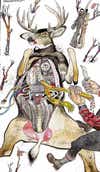
It’s time to move this sport into the 21st century
November, 2004 The time has come to admit that traditional hunting no longer fits the lifestyle of the modern recreator. Why? First, because it occurs outdoors. No place is more subject to rapid and uncomfortable changes in temperature. Nor are you more likely to encounter so many snakes, ticks, or harmful bacteria anywhere else. Second-“a major inconvenience-“you are not the one who determines when you hunt. A bunch of illiterate quadrupeds are in charge of scheduling. So you rise in the middle of the night, put on badly tailored orange clothing, and head out. Then, just to make it really fun, you hike until you’re hypothermic (elk), squint through powerful optics until you have a headache (mule deer), or sit motionless in a tree stand until a brown recluse spider builds a web in your ear (whitetails). And while you sit there like some fluorescent Buddha-“unable even to scratch your butt, much less use your cellphone-“your wallet is very active. It is hemorrhaging money, gushing an endless stream of cash for gear, licenses, leases, vehicles, and the beer you require to numb the pain after you have finished for the day and have nothing to show for it. To sum up traditional hunting: tedium, discomfort, and the loss of disposable income. If this is really what you’re after, try matrimony. But we live in an age of miracles. The technology and entertainment industries have come to our rescue with a new and better way to hunt. All a person needs is a personal computer: Fire it up, slap in a disc, and go virtual huntin’. The preview opens with pristine mountains, a tranquil lake, and, in the distance, a monumental brown bear gorging on blueberries. Up comes the pounding rock music that hunting has lacked until now, and the screen turns into crosshairs. Then comes the crack of a rifle and-“whoa!-“suddenly you’re riding the bullet cam, the landscape streaking by before the round slams into the shoulder of the grizzly. The bear drops like a cement truck. Sweet. Heart shot! reads the screen as celebratory fireworks explode. The game takes a photo of the hunter and bear. Then it drags the already taxidermied animal to a pedestal in the trophy room of a log cabin. Awesome. Now it’s my turn. So many choices. I select elk from the game-animal menu, and Montana for a location. But first, a quick stop by the weapons locker for, oh, maybe a .338 Winchester Mag. Sure, it’s a lot of gun. But virtual recoil is real easy on the shoulder. I take a moment to familiarize myself with the controls. I particularly like the “strafe left-¿ and “strafe right-¿ functions. And there are three gauges at the bottom of the screen, indicating my strength, level of fitness, and…what looks like oil pressure. Whatever. I’m not a detail guy. The computer loads the geometry, geography, and artificial intelligence-“very cutting edge. Next thing I know, I’m at the little hunting shack in Montana I will never own. There is an ATV idling a few feet away. I hop on and roar away. But I keep hitting rocks and trees. Then I fall off, sustain a broken arm, and have to start over. This time I hike to the top of a small mountain and do some glassing. There’s lots of nice scenery but no elk. Then I accidentally right-click the mouse and discharge my weapon. The game voice says, “I don’t think so.-¿ Even sarcasm is built in. On the third try I discover a really cool thing: When I hit a river, I do a breaststroke right through it and don’t even get wet. But then the opposite bank is so steep I can’t climb out. I flail around for a while until I drown, sinking slowly into the murky blue depths. Bummer. Back to start. Okay, no more ATV, no more swimming. Now I hunt smart. I walk for about six days and finally see a herd of elk in the distance. There is a bull with antlers the size of telephone poles. I dro Field & Stream Online Editors
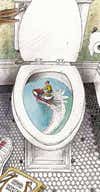
Cabela’s: Coming soon to a bathroom near you
December, 2004/January, 2005 Around this time each year a loud thump outside the house announces to millions of American sportsmen that the new Cabela’s catalog has just hit the front porch, flattening any flowerpot, bicycle, or dog on which it lands. After burying Duke in the vegetable patch, the breathless recipients attach a heavy chain from their ATV to the document and drag it into the bathroom for a first look. This lasts, on average, half an hour. Then, a simultaneous flushing of toilets causes reservoirs nationwide to fall 6 inches, injuring thousands of jet skiers and proving once again the existence of a just and loving God. The word catalog comes from the Greek katalogos, literally “words causing income to vanish.-¿ But catalog hardly begins to describe this magical work. A quick perusal yields information to live by. For instance, raise your hand if you knew any of the following three facts: The most recent catalog runs to 711 pages and weighs more than some Korean automobiles. The day is coming when a cabela will refer to a unit of weight. You will buy crushed stone and pig iron by the cabela. Diet pills will promise to help you shed those unwanted cabelas. Olympic lifters will bow their heads in silent tribute to the brave Ukrainian champion who was crushed when he attempted to clean and jerk what would have been a new world record of 100 cabelas. Dick Cabela’s empire started out small. Back in 1961, he placed a three-line ad in a magazine offering five hand-tied flies to any customer who would cover the 25-cent postage. Orders were processed at the company headquarters, Dick’s kitchen table in Chapell, Nebraska. The flies were sent back with a mimeographed sheet listing other sporting items for purchase. The operation has been so successful that nearly 6,000 employees now work in that kitchen. Mary, Dick’s wife, is said to be tired of having to make them sandwiches every day and thinks it’s about time to build a cafeteria. The Cabela’s catalog has long exercised a strange power over otherwise rational men. As you consider it in the privacy of the best seat in the house, it starts to seem like a good idea-“no, a responsibility-“to buy not only what you need immediately but also gear that you might need some day. Thus, guys who live on fishing boats in Alaska suddenly crave 17-inch camo snake boots. Others who have difficulty opening the hood of their truck covet the titanium-handled Leatherman Charge XTi with nine double-end bits should they ever run out of gas in the wilderness and have to drill for oil. Guys who’ve never bushwhacked through cover worse than the azaleas in their front yard must have the Filson Double Tin Cloth Chaps that stop the smaller shotgun loads at close range. I recently ordered the handheld Thor 10-million-candlepower spotlight. Why? Because let me ask you something: How stupid are you going to feel when hordes of eye-sucking aliens invade Earth and your entire family dies just because you lacked the wattage to signal other planets for help? My personal weakness is footwear. I’m the kind Field & Stream Online Editors
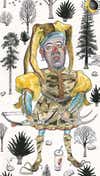
Only a certain kind of man hunts the entire season
February, 2005 I never expected to say this, but here goes: I’m glad the season is almost over. I say this for the following reasons: Now that the season is nearly over, I am almost looking forward to the traditional promises to family and collection agencies to do better. I pledge to be a better husband, father, and provider to Jane and…I believe our baby’s name is Emma. Oh, right. And Jane says she’s not a baby any more, she’s almost 5. In fact, my wife is holding up a calendar at this very moment and indicating that Emma’s birthday is in six days. And what she wants more than anything else is a 1997 Pink Splendor Barbie that retails for $900. Right now, I’m not in a position to haggle. Pink Splendor Barbie it is. (Note to self: Have bow appraised for cash value immediately.) What should a man think about at such trying moments? Me, I go for deer every time. I find it soothing to meditate on the bucks that have survived the season and are even now walking around out there in the dark. Bucks whose antlers have already begun to loosen ever so slightly. In just four or five months, performing a trick whose power is undiminished by the millennia, those deer will start to grow new, larger ones. Almost before you know it, hunting season will be upon us again. And the corporate goal of Bill Heavey Freelance Enterprises Ltd. will once again be reduced to two words: gas money. Field & Stream Online Editors

How to survive the winter in your basement
February, 2005 March is that magical month when Nature, rolling over in response to the sportsman’s gentle nudge, glares back with a party girl’s bloodshot eyes and tells you to stick it in your ear. Rebuffed, you stare out onto a soggy landscape in which it is impossible to tell where the earth stops and the sky begins. That’s when it hits you. It’s nuclear winter, that part of the year when all life seems to pause, and darkness and extreme cold envelop the earth. You’d see more activity inside the brain of a fundamentalist preacher. The ducks and geese are south of the border, sucking on a cold cerveza and stubbing their webbed feet into the warm sand. Surviving deer are thicketed up, still hearing the whistle of rounds that grazed their briskets. More than one grizzled 8-pointer is even now shaking his head in disbelief. “Chasing does during daylight in a beanfield? Why not just stand in the middle of an Izaak Walton shooting range and get it over with?-¿ He murmurs thanks to the trinity that has been saving his kind since 1963: (1) the .300 Winchester Magnum rifle; (2) the got-me-more-gun-than-you hunters from New York to Texas who choose this firearm because you never know when a seriously lost bull elk or marauding grizzly could pop up three farms over; and (3) the shooter’s flinch that happens when you combine (1) and (2). Without them, that buck would be swimming in tomato sauce and pinto beans right now. So what are your choices? Spring gobbler season is 30 days-“one eternity-“from now. Pattern your gun. Practice your purrs, cutts, and yelps. Lather, rinse, repeat until insane. Psych wards are full of superb turkey callers. Fishing? Absolutely. Let me offer some tips. Jig a 1-ounce spoon vertically in deep water and use a Carolina-rigged finesse worm for shallow presentations. Because a bass only needs to eat about once every two weeks when the water is below 50 degrees, your odds of getting a bite are about equal to those of having Donald Trump become your apprentice. But these are still the lures to use: the jig because you won’t wear yourself out casting the damn thing, and the worm because it’s a good “indicator-¿ lure. Any subtle tick in your line could, theoretically, be a bass. More likely, you have lost control of your hand muscles, indicating the onset of hypothermia. As always, you owe it to your loved ones to wear a PFD while on the water-“but not because it will save your life. Fall in and the shock of the cold water will instantly render you incapable of movement. By having the foresight to freeze upright, bobbing next to your boat, you spare search-and-rescue crews untold hours with the grappling hook. And the minnows will not have a chance to nibble your face into hamburger, giving the mortician something to work with should your heirs opt for an open casket. My advice for this time of year, if you are gainfully employed, is to bank some serious overtime pay against future outings. As an outdoor writer, I don’t have this option. When there’s nothing going on outside, there’s not much going on upstairs. What do I do with such freedom? Mostly I sit in my basement, stewing in frustration and the long underwear I haven’t changed in two days and a beard I haven’t shaved in three, drinking coffee until I start speaking in tongues. Last year, after several days of this, I couldn’t take it anymore. I put on my new Filson Wetlands Hunting Hat (purchased during a particularly severe bout of cabin fever), buckled it under my chin, and ran into my yard. Using only a pocketknife and a shoelace, I tried to fashion a bow drill, a friction-based fire starter I’d made exactly once in a survival course. I started by attacking a dead cedar tree. Soon I had fashioned the bow, spindle, socket, and fireboard. I spent the next three hours on one knee, bent over a wet piece of w Field & Stream Online Editors
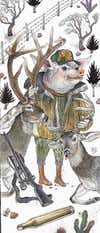
With the right clothes, anything is possible
April, 2005 Once or twice a year, some manufacturer of hunting gear mistakes me for a serious outdoor writer and invites me on a free hunt. Since the call usually comes two days before the event, I am obviously not their first choice. But if Philip Bourjaily suddenly has a custom shotgun fitting or David E. Petzal needs his back waxed for a Hot Shots of the Gun World photo shoot, they may call me. As a writer whose only tangible asset is his reputation, I have a strict policy for dealing with all such offers. I accept immediately. The people arranging this one were the manufacturers of Gore-Tex fabrics and Scent-Lok hunting duds, products that rank right up there with the pyramids and Britney Spears as among the greatest creations in history. They invited me to a two-and-a-half-day whitetail hunt on the 20,000-acre Halff Brothers Ranch in South Texas. The bad news was that it was for “management-¿ bucks, the small deer that are periodically removed from the herd. The good news was that in South Texas these are gargantuan, bigger than 99 percent of the deer a typical hunter sees in his lifetime. On a short hunt, it’s important to start botching things up early. At the airport, I was unable to lock my bow case because I had left the key on the kitchen table. “You don’t lock it, you don’t take it,-¿ the security guy said. Every pore in my body opened and began to leak sweat. I was saved by Eric Eshleman, a TSA screener who fills his downtime on the job by picking luggage locks. He locked the case using a twisted paper clip, then sent me on my way with the new key. I hereby nominate him as the permanent head of Homeland Security. I didn’t mess up again for nearly 20 hours. But bright and early the next morning, I decided to leave my release in the truck when guide Greg Bladgett and I were dropped off. We sat in a pop-up blind, as lethal as lawn jockeys, while a high-racked 7-pointer fed contentedly just yards away. Greg and I must be related, because he had decided to leave his cellphone in the truck, so we couldn’t call anyone to bring the release back. After a long silence, he dribbled tobacco juice in the dirt and whispered, “Aren’t we a couple of gold-plated idjits?-¿ On the final morning, with my chances to get a deer running out, Greg saw me readying my bow and said, “Ain’t gonna need that today.-¿ As I hadn’t re-zeroed my rifle, he handed me his bull-barreled 7mm mag, equipped with a 4×12 scope, and a handful of 140-grain ballistic-tip handloads. We set up in the dark, prone behind a log looking straight down at least 400 yards of road. At dawn, five does emerged to feed. Ten minutes later, I put the crosshairs on the shoulder of a shooter buck and squeezed. When the smoke cleared, Greg turned red. “You shot the wrong buck!-¿ he hissed. Then he turned pale. “I’m going to get fired.-¿ I had shot the only buck I had seen, which had since vanished. Better-“or worse-“much farther down the road lay a second, larger buck in its final throes. Greg told me he had seen the second buck just before I fired, knew it was too big, and figured it wouldn’t make any difference on the shot of the deer we had agreed I would take. Greg thought the deer I’d aimed at did not react as if it had been hit. I was pretty sure I’d made a good shot. Together, we walked down the road. At 120 yards, the animal I’d aimed for lay 15 feet off the road, as dead as a rock. He was a big, beautiful 130-class eight. We walked another 130 steps to the second buck. Evidently the bullet had continued on and hit it in the spine and femoral artery. He was definitely out of my price range-“a 150-class trophy with 9 points, tons of mass, and kickers galore. Depending on how you chose to look at it, I had made either the shot or the screwup of a lifetime. Greg called his boss, who in turn called the ranch ma Field & Stream Online Editors
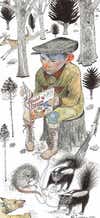
Rule No. 1: Don’t bring home skunks in a gunnysack
May, 2005 In conjunction with our IIoth anniversary, Field & Stream recently put out a call for longtime readers and heard from Hodgen O. Patrick Jr., who grew up hunting and fishing in Jasper County, Missouri, took some shrapnel aboard a destroyer defending Guadalcanal in 1942, and learned to tie flies during three and a half years of rehab at a naval hospital in California. At 91, he lives 20 miles from the farm where he was born and still ties 3,500 to 5,000 flies a year. I called him, expecting a sweet old guy who would pat F&S; on the back for the pleasure it’s given him over the years. The first thing he did was tell me what the magazine was doing wrong. “When I was a kid, there were guys right here who went and hunted the Oklahoma Territory around Sand Springs. They’d go for 40 days, shoot a whole bunch of turkeys and deer, then sell them to a meat buyer in Tulsa. Sportsmen eventually put a stop to that. And then we congratulated ourselves for the longest time about having gotten rid of commercial hunting. Fine. “But now we’re commercializing it all over again. Today, it’s all about guides, lodges, and gear. But hunting and fishing, they’re about the experience of the individual. And you don’t get that at a lodge, or with a guide, or by having the latest gadget. “I’ll tell you why this matters. We won our independence from the British because of men who had two things: a knowledge of hunting and a cause they believed in. Hunters have always been the backbone of the Marines and the Army. The great hero of World War I, Sergeant York, was a hunter from Tennessee. So hunting, from that standpoint, really is priceless. It’s something that develops a man’s character. And the only way you do it-“learn to shoot, scout, move in the woods-“is by getting out there alone.-¿ I asked him when he first started getting F&S.; As a boy, he says, “it wasn’t a question of subscribing. It was a question of being hungry for something to read. We kids would pass around stacks of magazines-“read them until the print wore off and they fell apart in our hands. I couldn’t afford to subscribe until after I got married.-¿ Mr. Patrick reminisced about the .22 Stevens Little Scout he got on his 10th birthday. He practiced until he could hit a running rabbit more often than not. And he told me about the time he and a friend decided to make some money getting furs. With the help of a dog, the boys captured two skunks and a possum, all alive. Since it was still warm out, the young entrepreneurs figured the smart thing to do was to keep the animals until their winter coats came in. He walked home with them in a sack over his shoulder. “Before I even turned off the highway into the farm, Mama threw up the window and yelled, -¿Sleep in the barn!’-¿ In the winter his father would put gunnysacks over his and his sister’s boots, then secure them with baling wire so the two could stay outside and play all day. “There was a girl from the farm near ours who watched us. Dad was very wise in his way. He told her, -¿Just keep up with them and keep them safe. Don’t corral them.’ That’s what she did. I ran into her many years later. When I asked if she remembered us, she said, -¿Lord, I sure do. You kids about ran me to death.’ “It’s been a good life,-¿ he says. “I’m lucky to still be around. And it still makes me feel good to tie flies, to show I can accomplish something-“even sitting on my butt.-¿ Nowadays, Mr. Patrick ties wet flies exclusively. “I read that 90 percent of a trout’s feeding is done under the surface. Makes sense to me to put your fly where the fish are looking for them.-¿ He laments that so many beginning fly-tiers give up too soon. “The thing I learned is that your fingers won’t do anything you tell them to at first. But you just keep at it, and pretty soon they’ll do Field & Stream Online Editors
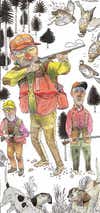
I’d be a better shot if I could afford it
June, 2005 Money can’t buy happiness, but it can substantially upgrade the quality of your misery. Take me, for example. It’s a crisp morning in southwest Georgia, and I’m holding a slim Italian-made 20-gauge at port arms as I stride through the brush. The engraving of quail and dogs on it cost the eyesight of untold craftsmen, and the Circassian walnut stock has a grain like a Damascus blade, flashing purple highlights when the sun hits it. A hundred yards ahead, past the wire grass and plots of milo and sunflower, I can make out the well-muscled haunches of English pointers that receive more daily attention than those of Jennifer Lopez. Suddenly, the dogs turn to marble. Jack, Thommy, and I pull even with each other. Jack Unruh, whom I had never met before, is the illustrator whose depictions of me as a clueless nimrod on this page have brought squeals of joy from my daughters. We arranged to meet in Georgia so I could finally confront him about this, man to man. But he disarmed me by sneaking up on me at the baggage carousel at the airport and whispering, “You’re even uglier in real life.-¿ Thommy is a friend of Jack’s from way back. He owns about 9 billion acres of land managed exclusively for wild quail, and I am looking for the right moment to tell him that I want to be his new best friend. We pause, awaiting Thommy’s nod, then advance. The birds erupt-“always the same, yet always startling-“and scatter like jazz musicians, each riffing wildly on the theme of “downwind and fast.-¿ Jack is a pretty good shot. Armed with this self-pointing stick, even I make a pretty sight every so often. But Thommy, toting a .410 soda straw (albeit a Purdey), plucks them down with a single-mindedness that Old Scratch himself would admire. He is the best shot I have ever seen. After a while, even the .410 seems like too much gun. Growing conditions below the Mason-Dixon Line are especially suited to larger-than-life characters like Thommy, who combines scandalous amounts of old money and charm, plenty of horsepower upstairs, and a hint of insanity from having been on the losing side in the Civil War (don’t take this the wrong way; it runs in my own family). “My ancestors were quite successful raising cotton and tobacco, and Daddy did the same in peanuts,-¿ he tells me while we rotate in a fresh pair of dogs. “But my personal cash flow improved dramatically upon my father’s death, when I was 19.-¿ Thommy’s father, a flinty fellow who could afford any gun on earth, hunted with a battered Remington Model 11 with a Cutt’s compensator. Fancy guns were for fools. You showed your respect for the birds with your shooting ability. His pleasure must have been keen when his only son took to quail hunting right out of the box. Thommy shot his first limit by age 9 and was a nationally ranked skeet shooter as a teen. He knew without being told to conceal his yearning for fancy firearms. “There are people around here who will tell you that I ordered my first Purdey before my father was in his grave. Not so. It was the Monday morning after the service. At which time I ordered three. “I knew Daddy wouldn’t have approved, and I regret that. In fairness to myself, however, he had his own secrets. One was that his grandfather had come to Georgia to escape hanging for horse thievery in Virginia. Another was that I am actually the child of a woman he met only once and sent off to New Orleans with a trust fund.-¿ Although this seemed quite a confession, it was clear Thommy wasn’t telling me anything he hadn’t told many others. And you don’t really talk to men like Thommy. You listen, nodding in the appropriate places. I made a double late in the hunt, a sensation so sweet that I wanted nothing so much at that moment as the financial wherewithal to experience it regularly. But time moves fast in Fa Field & Stream Online Editors
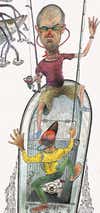
Can I keep my spinning rod–and my job?
July, 2005 Recently, the editor-in-chief of this magazine, Sid Evans, invited me to chase tarpon and snook with him in Florida. I accepted enthusiastically and began sweating like a low-level mafioso asked to go for a boat ride. Possible reasons for the summons include the following: (1) He has just read one of my expense reports a little too closely, (2) David E. Petzal is again lobbying for me to cover carp noodling in North Korea, or worst of all, (3) he expects me to flyfish. In which case I am toast. On the off chance that years of neglect have improved my casting skills, I get out my fly rod, set up in the backyard, and begin hitting myself in the forehead with a weighted nymph. It’s not that I don’t know how to flyfish. In just 25 years, I have gone from raw beginner to advanced beginner. But here’s the thing: I have almost always felt like a hypocrite with a fly rod in hand, as if I were trying to impress somebody watching from the bushes. And I’ve always despised the snobbery of so many flyfishermen. Plus, I stink at it. I can hear you long-rod boys getting your backs up already. “We’re not better, just different,-¿ you huff. “After all, what really matters is having a good time.-¿ Translation: “Our idea of entertainment is Shakespeare, and yours is the back of a Froot Loops box. But the important thing is that we both love to read.-¿ My idea of fun is catching fish. Tons of them if possible. I love the tug and the way all three of us-“the fish, the line, and I-“become electrically connected for a few moments. I can count on zero fingers the number of times I’ve gone to bed thinking, Damn, that would have been a pretty good day if I hadn’t caught so many fish. But you can’t tell a flyfisherman that. He’ll give you some mumbo jumbo about “loving the process,-¿ spit white wine in your eye, and run you over with his Saab. Despair over the outing with Sid drives me to set up a casting lesson with flyfishing legend Lefty Kreh a couple of days before the trip. Nervous as a fat hog in December, I call that morning to confirm the appointment. “What time did I tell you?-¿ Lefty asks. “Eleven,-¿ I say. “Don’t you remember?-¿ “Hell, I’m 80 years old,-¿ he cackles. “I don’t even remember why I just came upstairs.-¿ Put a fly rod in Lefty’s hands, however, and he remembers everything. We get right to it, casting on a pond near his house. “Forget all that crap about the clockface,-¿ he tells me. “It’s not where you start or end, but what direction the rod tip is traveling when you stop that determines where your cast will go. And it sure ain’t about power. I can throw a line 100 feet into the wind with two fingers.-¿ Holding the rod between his thumb and first finger, he does exactly that. It’s like having Harry Houdini tell you how easy it is to pick locks with your toes or Dan Marino explain that any newborn could throw a perfect spiral 70 yards. In spite of myself, I begin to make progress. “That’s it,-¿ says Lefty. “Firm wrist. And forget that b.s. about holding the elbow in tight. It can move all you want as long as you keep it on the same level. Imagine your elbow sliding along a shelf. Yeah!-¿ For a few minutes there, I actually believe I can pull it off. In the Everglades three days later, I am offered a chance to take the bow platform and cast a big fly tight into the mangroves for snook. I confess to not being a great fly caster. After watching me for a few minutes, our guide quietly begins to assemble some spinning tackle and hands the long rod to Sid. I am delighted to report that he is not the world’s most stylish caster, but he does possess an annoying knack of getting the fly to land where he wants it to go. Possibly it is just afraid of becoming unemployed otherwise. Anyway, it wasn’t long before he had a good snook on. And a minute later, I had one, too. That n Field & Stream Online Editors
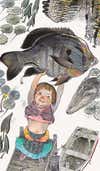
How I (nearly) taught my daughter to love fishing
August, 2005 The first rule of introducing a kid to fishing is that you absolutely must catch fish. Later on, he or she may be open to the idea of “enjoying the experience.-¿ But at 5, believe me, they are out for blood. You get two, maybe three shots before even the dumbest Clifford the Big Red Dog DVD beats the hell out of watching a bobber do nothing. And then you have lost your child to all sorts of horrors: gangs, methamphetamines, violin lessons. The first time I take Emma fishing, she is psyched right up until she steps into the canoe. Normally, water holds no terror for her. But now, just as we are about to shove off, her lower lip starts to tremble. “Gustave,-¿ she whispers. Gustave is an all-too-real Nile crocodile we have recently seen on a National Geographic special. He is more than 20 feet long and in the past few decades has eaten over 200 people, mostly fishermen in a river near Lake Tanganyika. The story of the French naturalist trying to trap Gustave for study made for a riveting documentary. The only problem was that he failed. Gustave is still out there. “Don’t worry, Monk-a-lula,-¿ I tell Emma. “Gustave never comes here. It’s too cold.-¿ Emma checks the shoreline for crocs. I can almost see the machinery in her brain weighing her father’s perfect record (so far) of keeping her safe versus the primordial reptilian monster. The first tear streaks her cheek. Game over. The second time, I decide to fish from shore. Emma has already shown remarkable casting potential with her little Tigger-themed push-button outfit, recently putting so much wrist into a cast with the yellow “fishy-¿ practice plug that she snapped the line. I bait a No. 6 Eagle Claw hook with a worm just below the bobber. Emma attempts three casts, none of which reach the water. I gently take over, but the rig is so light that even I can barely get it out there. Fishless after two minutes, she starts throwing gravel into the water. “Monk, that scares the fish,-¿ I tell her. “That’s okay,-¿ she assures me brightly. I change locations, wanting at least to produce a fish so she understands the goal here. She follows, with larger handfuls of gravel. “I’m fishing here,-¿ I say. There is a silence. “Can we go home?-¿ she asks. Zero for two. It’s the bottom of the ninth inning. Unless we get on fish quickly the next time, my daughter will be lost to me forever. She will become an animal rights activist and be trampled to death by hogs while attempting to liberate the stockyard at a Jimmy Dean plant. The day of reckoning finds us at a shallow bass pond. I am prepared with two Shimano kids’ outfits (one for backup), a bucket of minnows, juice boxes, string cheese, SPF 50 sunblock, insect repellent, and spare underwear. Emma works up the nerve to stick her hand in the bait bucket. When a minnow brushes her fingers, she giggles and yells, “They like me!-¿ I bait one through the lips and toss it to a fishy-looking corner. It dances around for five minutes, nudging the bobber this way and that, and I am sure we are about to nail one. But it never happens. This is evidently bluegill water. We go looking for worms and hit pay dirt by uprooting sod near a seep downhill from the pond. Emma cannot believe the abundance of the earth. Each new worm sends her into near delirium. “Another one!-¿ she squeals. We put two dozen worms in a cigarette pack we find on the ground. Three minutes later, the bobber heads south like a share of Enron stock, and we have our first bluegill. “That is a huge fish!-¿ I say of the 5-incher flapping at the end of the line. “A humongous-bungus fish! And you caught it!-¿ All 34 pounds of my daughter are squirming with excitement. I ask if she wants to let it go. “No! I want to keep it! I want to eat it! Let’s catch some more!- Field & Stream Online Editors

Sure, I’m over the hill. Now pass me a worm
September, 2005 I recently had one of those dangerous ends-in-a-zero birthdays that lure middle-aged guys into taking stock of their lives. This is a dicey business, frequently leading to despair and rash action, such as running off with the baby-sitter or dropping 60 grand on a candy-apple-red pickup with a Viper V10 engine that will pass anything on the road except a gas station. Me, I went bass fishing, arranging to meet my buddy Greg at a nearby lake. Greg is a curmudgeon, a painter and sculptor whose work gets high marks from critics but is too candid and straightforward for our sophisticated times. His latest project, for example, is a series of anatomical human hearts about four times life-size, meticulously sculpted in red cedar. A rare hereditary disease in Greg’s family caused the hearts to pack it in early, almost before they got started. Eight siblings, including his twin, died in infancy or childhood. Greg doesn’t know how or why he escaped, but he grew up more closely acquainted with death than any kid ought to. His two obsessions, art and fishing, help him cope. Each cedar heart requires thousands of hours of focused solitude with chisels, gouges, and carving burrs. He fishes like he sculpts, so I learned long ago not to promise to be home by a certain hour when I go fishing with him. The weather on the anniversary of my birth was practically an invitation to self-pity: hot and thermally inverted, a sky the color of plumber’s putty holding down air that you didn’t want to inhale any more of than necessary. We figured the bass would be deep and set about trying to dredge some up, starting with the closest structure, the riprap where a bridge crosses the lake. Greg was throwing a deep-diving Shad Rap that looked like a perch dressed in drag, and I was slow-rolling a 1/2-ounce spinnerbait. It was too deep to anchor, so we drifted under the bridge, paddled back up, and drifted it again. All the while, Greg ridiculed my spinnerbait, a lure he considers vulgar. “There is nothing in nature that looks like that. Have you ever in your life caught anything with it?-¿ I told him that I had, as he very well knew but had forgotten because his fragile ego deletes any memory in which he is outfished. After a spell we headed for a line of standing timber that marked a drowned road and tied up to a dead trunk in 25 feet of water. Greg tied on a Zoom Trick Worm in watermelon gold glitter. For two hours straight we fished without a hit. Finally, at about 7 p.m., the day began to soften. Snapping turtles surfaced and blew bubbles. A bullfrog started honking in the long grass along the bank. Suddenly Greg grunted. “I’m on.-¿ A fat 21/2-pound bass jumped twice on its way into the boat. Five minutes later something slammed my spinnerbait and started to torpedo this way and that under the surface. It was a tiger muskie about 2 feet long and mad as anything that dinner came with a hook in it. With my spinnerbait mangled, I made a small gesture with my left hand and soon a fresh Zoom slapped me in the back. Such are the advantages of fishing with the same guy for 20 years. We each set the hook on a few more bass before my cellphone buzzed in my pocket. It was my wife, Jane, who, strangely, asked to speak to Greg. In the stillness of the twilight, I could hear every word. The guests had been waiting at the house for an hour. Had he forgotten? “Not at all,-¿ he said evenly. “Everything’s fine.-¿ Greg ended the call and handed the phone back. Great. Jane didn’t know that relying on Greg to leave off fishing and get me to my own surprise party on time was like asking Michael Jackson to stop hanging out with kids and meet you at a policeman’s ball. Even if we paddled back immediately and I broke the speed limit the whole way, I wouldn’t be home for another hour. Greg calmly rerigged his worm Field & Stream Online Editors
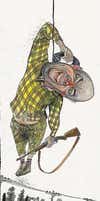
The phone company wants my gun
November, 2006 No, dear Recorded Lady of the phone company, you listen closely because my menu options have changed. Press “1-¿ if you think I will be the one to give up first and let you keep charging me for stuff I don’t need just because I have been on hold for six hours. I would rather be in my tree stand, but as a hunter I am skilled in the art of waiting. Press “2-¿ if you think I am awash in disposable income and have no need for a new deer rifle. Press “3-¿ if you want to speak to me, a dehydrated but determined hunter who is prepared to wait until the Rapture to fix the automatic leak your company installed in my wallet. Those funds have already been earmarked for the Remington 7600 pump .270 that my friend Ty is selling. Ah, Recorded Lady, if only we had met under happier circumstances. Instead, I opened my monthly statement from your company (which discretion prevents me from naming, although its initials apparently stand for Making Customers Insane) and discovered that I am paying an extra 99 cents per month for the anachronistic luxury of a paper bill. It was this change that prompted me, many hours ago, to call and switch to online billing. I will continue to hold, because 99 cents a month adds up. Over 25 years, it comes to $297, enough to buy Ty’s rifle, with its twin action bars, free-floated barrel, and quick-release four-shot magazine. Ah, Recorded Lady, you have returned after a short interval of toothless smooth jazz. You explain that my long hold time is due to “an unusually heavy volume of calls.-¿ And yet this is the only kind of volume of calls your company experiences. You assure me that, even now, an army of customer-service representatives is engaged in hand-to-hand combat over the privilege of serving me. Meanwhile, exciting news! Did I know that I can register for a chance to win $10,000 just by signing up for DSL service? Actually, Recorded Lady, I do my lottery playing at 7-Eleven, just like everybody else. Recorded Lady, did you know that the 7600 goes unheralded on virtually all “Greatest Deer Rifles-¿ lists? Yet it is an excellent firearm: inexpensive, accurate, and as dependable as an old rotary phone. What’s more, it’s a great gun for still-hunting, since it offers faster follow-up shots than any bolt action and even some semiautos. No, Recorded Lady, I do not wish to sign up for the CallManager feature that would allow me to stage miniature United Nations conference calls with nine friends and connect to satellite imaging so I can find lost garden tools in my own backyard. But thanks for asking. The gun in question is available because of an unfortunate experience Ty had hunting mule deer a few years back in the Montana badlands. Crawling on his belly for half a mile toward a buck with a rack like a Sears dump rake, my friend at last attained the cover of a small rock. He then looked down and saw a rattlesnake occupying the very same real estate. Although the serpent showed no aggressive intent, Ty found himself unable to reciprocate. Emitting one of the louder screams ever made by a surviving licensed electrician, he levitated from prone to standing by force of will alone and clubbed to death what turned out to be a 2-foot hank of barbed wire left over from an old fencing job. The serpent was reduced to rusty powder, the walnut stock sustained extensive rock- and barbed wire-“related injuries, and the buck bounced happily out of sight. This experience soured Ty on Montana, mule deer hunting generally, and that 7600 in particular. Here’s the beauty part, Recorded Lady. It still shoots fine, and the very defects that mar its cosmetic appeal make it attractive to tightwads like me. I have always held that the first thing to do with anything new that you love is to go out and bang it against something. Once that initial ding is out of the way, you can ge Field & Stream Online Editors
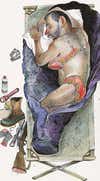
Hard-won knowledge about deer and pants
December, 2005/January, 2006 No part of this magazine is more eagerly awaited than the sage advice from the likes of Jerome B. Robinson, Keith McCafferty, and T. Edward Nickens. These are guys who know from personal experience that: I learned some valuable field lessons myself this year that I’d like to pass on. I’m not claiming they rise to the postgraduate level of woodsmanship. But if you’re still awaiting a bunk in the gifted-and-talented section of hunting camp, listen up. Sleep with your clothes on.
On a deer hunt in the Adirondacks, Gerald Marcury and I agreed that I would head out before first light, hike to a distant saddle, and ambush any bucks he might push my way while still-hunting. As I sweat easily, I opted to hike in long johns and a wool shirt, then don additional layers as needed. This plan worked perfectly right up until I sat down on a cushion of pine boughs and realized that my Realtree pants were folded atop my Realtree sleeping bag back at camp. Four hours later, Gerald approached, deerless but smiling nonetheless. “Is that a Southern thing, no pants?-¿ he asked. Six months later, I met up with Gerald and a buddy to have a beer. I started to introduce myself to the friend, who shook my hand warmly and said, “Oh, you’re famous. Everybody in the hunt club says, -¿You should’ve seen the guy from FIELD & STREAM who forgot his pants.’ We even have a saying now.-¿ He dropped his voice to a TV-announcer baritone. “Pants: Don’t leave home without ’em.-¿ (Gerald, allow me to thank you publicly. I have never met a guy who sleeps in women’s underwear who is half the hunter you are.) Hunt with SpongeBob.
As I let my daughter Emma off at kindergarten before going hunting one October morning, I pointed up and cried, “Oh, look at the hawk!-¿ Then I palmed the SpongeBob SquarePants Sea Mail Play-a-Sound book she had been reading, which her teachers have forbidden in the classroom. I thought no more about it until I was on stand and realized I had inadvertently stashed the thing in my daypack. After not even seeing a deer all morning, and with nothing to lose, I pushed the button decorated with a giggling SpongeBob. Out came a sound like a doe bleat on helium. Intrigued, I hit it again. A doe emerged from the bushes 70 yards distant, where it stood alert and frozen for two minutes. I hit the button once more. Fifteen minutes later, I sent an arrow into that deer. I am unsure about SpongeBob’s sexual orientation, but I will say this: The boy knows deer. Impersonate a competent person. Anybody who hunts with me regularly knows that I am essentially useless. I am physically unimpressive, have the woods sense of a parking meter, and for years thought that a “staging area-¿ was where deer rehearsed theatrical performances. I’m tolerated by other hunters because I know my place and because a natural bent toward arson makes me invaluable in starting and tending campfires. To make up for my defects, I religiously read the tips in this magazine, then pass them off as my own at every opportunity. Recently, when a friend was lamenting the loss of his scope covers, I plucked an old inner tube from his truck bed, cut out a ring, and wrapped it over the optics, forming a watertight seal (Sportsman’s Notebook, October 2005). “Where in the world did you learn that?-¿ he asked, amazed. “Old cowboy trick,-¿ I shrugged, affecting the air of a man who had grown up in a sod house on the prairie with Pa riding the range and Ma fighting off Indians. Shut the bathroom door.
Much of my rifl Field & Stream Online Editors
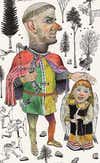
My daughter is wasting her time at school
February, 2006 This whole job-marriage-family thing is putting a serious crimp in my deer season. Had I known before what I know now, I might have done things differently. Think of a hunting version of the 1970s TV series Kung Fu. Orphaned as a child, I enter a monastery in Iowa, where I learn the secret rites of Unitarian Universalism and purify both mind and body by continuous practice of archery and still-hunting. One day, after besting the emperor’s vain eldest son in a 3-D tournament, I am forced to flee, driving first prize: a Dodge SRT-10 Quad Cab (Viper V-10 engine, custom Mossy Oak paint, power-bulge hood, and cigar lighter). I become a nomadic monk, hunting and fishing my way from town to town, teaching the Ten Suggestions that lie at the heart of Unitarianism and encouraging people to form meaningful discussion groups. In time I attract disciples, young men from farming villages who are drawn to my humble dignity and secret knowledge of deer. Eventually, the emperor’s son, regretting his rashness, seeks me out to apologize and offer vast sums of-” Jane taps my foot, jolting me back to the fluorescent lights of Parent Participation Night at Emma’s kindergarten. My butt, I now notice, has gone numb from the folding metal chair. It no longer belongs to me. It has gone away to become someone else’s butt for a time. Like the soul of a shaman, it will return to my body upon completing its quest. Strange that it never goes numb in a tree stand. I could be out there now, 20 feet up and 50 yards inside the timber on a trail leading to what I believe is the last standing patch of corn in the county. Were I not trying to amass credits as a good father (so that I can get back to the woods another time), that’s where you would find me. I missed the first day of bow season back in September for a similar meeting, Parent Orientation Night, which was unnecessary in the extreme. Not only did I already know the layout of the school, I had logged it into my Garmin as a waypoint. Tonight’s riveting presentation is something about Preparing Our Children for the Future. Under the new Standards of Learning (official slogan: “Creating a nation of professional test-takers, one worksheet at a time-¿) the school day is now so crammed with opportunities for your child to check the right box that if he or she is tardy more than three times in a semester, you can officially kiss college good-bye and start planning for that career in cosmetology. I wonder if all this hothouse learning is what my daughter truly needs to flower. Perhaps I should field-school her during October and early November. Liberated from the confines of the classroom, a radio-collared girl running the woods in a zigzag pattern might flush bedded deer my way during the slow midday hours. Mom would not go for it, of course. Nor would some of the more alarmist child-protection people. But they wouldn’t necessarily have to know. And Emma, who learns quickly, would probably not need a shock collar after the first couple of outings. She’d be getting healthy exercise, learning about the deer woods, and spending quality time with her dad. A win-win-win situation, and only during archery season, of course, because Emma’s welfare comes first. The meeting finally ends. The spirit of my butt returns to its corporeal home. At the school playroom, a quietly fuming sub hands us our little monster, whose legs are encrusted with paste, glitter, and paint. “Like the circus girl,-¿ Emma chirps. We get home and see that our neighbor has put up an electric Christmas reindeer, a motorized wire skeleton covered with tiny white lights that turns its head every 15 seconds. As Jane precedes us into the darkened house, I grab my daughter’s shoulder. “Emma,-¿ I whisper, hunkering down next to her. “Deer! Don’t move. Let’s sneak on it.-¿ There i Field & Stream Online Editors
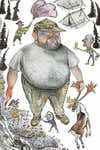
In hunting camp, size does matter
March, 2006 Any time you throw together a bunch of guys who don’t know one another in hunting camp, it takes a bit of scratching and sniffing before the top dog emerges. I have been in this situation often enough to know three things about the process: I was recently hunting caribou above the Arctic Circle in Alaska (a phrase, incidentally, that I now work into every conversation I have, including with whomever is on the other end of the intercom at the big red drive-up menu at Wendy’s), when I found myself sharing a tent with Steve Freese, 56, a newly retired Douglas County, Nebraska, cop, who clocks in at 5-foot-8 and about 245. He has the widest-set eyes I’ve ever seen on a human and a head like a bowling ball. The younger men figured that putting the two hunters most at risk for rapid-onset Alzheimer’s in the same tent was a no-brainer, which suited us fine. Young guys invariably assume their lives are unique and fascinating, but older guys know that, superficial differences aside, we’re really all as alike as eggs. The superficial difference between Steve and me was that I spent 10 minutes each morning rooting around in my duffel for any socks and underwear that might have been miraculously freshened by 24 hours in a tightly packed bag, while Steve would simply fillet a vacuum-sealed plastic pouch and remove clean socks and long johns. He had made these packets up using a Cabela’s food vacuum sealer. “Handiest damn thing you ever saw,-¿ he said. “Food is just the beginning.-¿ As we all sat around the fire the first night, Steve sipped a Beam-and-Sam’s-Club-cola. One of his last duties as a police captain, he said, had been as a trainer, whipping new recruits into shape before they could hurt themselves or, more important, older cops. “First thing, I’d ask them, -¿How many of you guys have heard that there’s no such thing as a stupid question?’ And they’d be so eager, you know, just clawing over each other to get their hands up first. -¿Well, that’s a bunch of bull crap,’ I’d tell them. -¿Your best move for the next two years is to shut up and listen.’-¿ Later, we all weighed in with our hunting plans and ambitions. Steve opined that he was as likely to take a caribou close to camp as not; other factors being equal, he preferred less hauling to more. Sure enough, at about 2 P.M. the next day, he dropped a heavily racked bull just 350 yards from camp. Hearing the shot, I hustled over to help, arriving in about 20 minutes. By that time, Steve was cleaning his fingernails with his knife. At his feet lay four neatly butchered quarters, hide still on to protect the meat, and a small mountain of expertly cut tenderloins, backstraps, neck roasts, and rib meat. Nearby were the clean, white bones of his bull, innards intact. It was astounding knife work. “You didn’t gut him,-¿ I said, making my daily entry in the Stating the Obvious Sweepstakes. “Just more work,-¿ he replied. I made him a deal on the spot that I’d carry his meat if he’d help butcher mine. When they saw the carcass, most of the other guys followed suit. The fat man’s stock had begun to rise. Steve also turned out to be the best cook in camp, pushing it higher still. It was as if he had known all along he would be the lead dog and couldn’t be bothered to compete. Pretty soon, he had only to casually note that we were running low on water or that a pan needed cleaning before one of us, me included, would quietly hop to. One of the younger guys, handing him a Beam-and-Sam’s-Club after Steve had made the venison fall off the guy’s bull like it was overcooked stew meat, asked if the drink was mixed to his liking. Steve nodded deeply, then threw me a little wink as if to say, Rookies. You g Field & Stream Online Editors
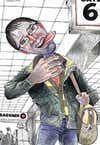
I never should have tried to outhunt my boss
April, 2006 Not long ago, the editor-in-chief of this magazine, Sid Evans, invited me on a two-and-a-half-day deer hunt at his father’s club in Mississippi. To understand what an editor is like, picture an Afghan warlord-“bloodthirsty, cunning, perpetually bent on revenge-“plying his dark art in a room decorated with the trophy skulls of his enemies. Lose the turban, give him some skin-care products and a little dental work, and-“voila!-“say hello to the boss. But make no mistake. The dynamics are unchanged. When he issues an invitation to me, a humble foot soldier, I accept instantly. The plan was to meet up at the Memphis airport with Evans’ father, John, drive south to the 6,000-acre club near the Mississippi River that he shares with about 30 other members, and hunt the muzzleloader season. I met Sid and both of his parents at baggage claim, and we caravanned to a barbecue joint for massive quantities of pulled pork and coleslaw. For an editor, Sid comes from amazingly upright stock. His father, affable and easygoing, is a diehard bowhunter and fisherman. His mother is a woman of goodwill, beauty, and charm. I doubt that these were his real parents. After lunch, the men loaded up and drove south into Coahoma County. As we crossed the great hump of a levee, I resolved to ingratiate myself with the actor portraying John Evans because that guy has a gate key to 10 square miles of deer heaven-“bottomland hardwoods under intense QDM. Members shoot only bucks 41/2 years old or older. Sid and I shared a room at camp. “Fair warning, I snore like a bear,-¿ I said. (I was looking forward to tormenting his sleep, as he so frequently ruins mine with 4 P.M. e-mails suggesting a quick total rewrite of a story by the next morning.) “Me, too,-¿ he answered brightly. Then he rolled over and fell instantly asleep, an ability common to Stalin, Hitler, and other despots. Disturbingly rhythmic snoring kept me awake for hours. Dark and early the next morning, we headed out to stands where good bucks had been seen recently. “You snore like a damn chain saw,-¿ I told Sid. “Really? You were moaning all night,-¿ he answered. “Sounded like a crazy woman having a bad night at bingo.-¿ This was all the more embarrassing because it was probably true, as my wife has reported similar sounds. I had brought my bow along, a not-so-subtle reminder that I possess a skill Sid has yet to master. After a full day afield during which nobody saw a buck, I decided that the point had been made and asked his “dad-¿ if I could borrow an extra muzzleloader. I had revenge in mind. On our only other outing together, Sid had boated a big tarpon, while I had demonstrated why I should never be given a loaded fly rod. But the rut was winding down, and the second day passed with little more activity than the first. On the final morning we just had time for a three-hour hunt before dashing back to Memphis. I sat in a ladder stand overlooking a promising brushy area. With 15 minutes left, a set of big brown antlers popped into sight, headed toward me through the tangle. My view was lateral, offering no indication of width. Nor, in those few moments, could I count tines. But the prison break in my chest said that this was a shooter. The buck came quickly up out of a small gully and stood for a moment in an opening 80 yards off. As the crosshairs settled on his chest, I fired. He galloped off and was gone. From sighting to shot had taken all of about eight seconds. Sid came over at the sound, and together we madly searched the area for sign until we were in real danger of missing our flights. All we found were a few clipped hairs where the buck had stood. To his credit, Sid seemed genuinely sympathetic. “You’ve been shooting a bow all year instead of a rifle. And you’d never even shot this gun before. It hap Field & Stream Online Editors
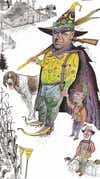
Life as a humble farmer looks pretty good to me now
May, 2006 Last summer, Jack Unruh, illustrator of this column, and I, with no more sense than a couple of babies playing with steak knives, convinced ourselves to take a pheasant hunting road trip to North Dakota in October. We talked it up over the phone until we fell for our own B.S. about pheasants that had never seen a hunter and dogs leaping through the prairie grass. Then, the week before the trip, we both came clean. I admitted I had never actually hunted pheasants. Jack mentioned that his dogs were “unfinished.-¿ “Willy Mae points when she’s in the mood but won’t hold it. Rudy is like her, only without as good a nose. Plus he pees on my leg sometimes. It’s a dominance thing.-¿ He had also realized that he had better pack a sandwich, as the 1,300-mile drive from Dallas to Bismarck might take an entire afternoon. To break up the trip, Jack invited his friend Richard Stucky along. Richard is an independent farmer in Pretty Prairie, Kansas, population 604. He doesn’t make much money or get off the farm often, and we sort of patted ourselves on the backs for including him, as if we had started a Take a Farmer Hunting Foundation. Actually, Richard-“a stocky, slow-talking fellow about my age who looks younger, probably because he isn’t worried all the time-“hardly detracted from the trip at all. His 100-pound German shorthair mix, Dusty, was a dream dog. “Who trained that critter?-¿ I asked Richard one day, as Dusty released a rooster into his hand. “Me,-¿ he said. Turns out that Dusty gets almost daily practice in season on the quail that Richard raises and hunts on the farm. Depending on what he and his wife, Connie, feel like eating, he also goes after deer, ducks, geese, and rabbits. He has a bass boat and four coonhounds. I was losing sympathy for poor Richard by the minute. Jack volunteered that his friend was the only guy he’d ever known who’d worn out a shotgun. “And he did it on birds alone. No targets.-¿ I asked Richard about farming. “There’s no money in it, but I’d die if I had to get a desk job. I’ve got about 200 acres of my own and lease another thousand. Wheat. And I do custom harvesting to subsidize the farming. But it pretty much lets me hunt whenever I want to.-¿ “So you have all those big machines?-¿ “Yeah.-¿ -¿’Aren’t you sort of screwed if one breaks down?-¿ “Well, you just have to fix it.-¿ It turns out that poor old Richard could fix just about anything: green hunting dog, combine, or clogged motel ice machine. He permanently fixed any pheasant that got up within 40 yards of his battered, no-name side-by-side. “Secondhand. Fella at the gun shop said it’s a Belgian. Little shorter stock and a lower comb. Fits me good, especially in heavy clothes.-¿ We soon discovered that he was also the best judge of public-land cover likely to hold birds, so Richard rode shotgun, Jack drove, and I slept in the back. Richard got his three-bird limit every day, often before lunch. Jack limited out some days. And several times I scared a bird so severely with my first two shots that it committed suicide by flying back into the third. Richard, seeing how spastic I became every time a feathered Improvised Explosive Device went off at my feet, had to bite his lip to keep from laughing. “You gotta relax, Bill,-¿ he finally said. “They hardly ever attack people.-¿ One afternoon, I asked Richard about the shotgun Jack had mentioned. “Dad bought me that gun new, a Franchi, back in 1967 when I was 12. And eventually the little hook in the receiver block that pulls the empty shell just broke off. I got a ¿¿-inch chunk of key stock, cut it, and filed it down to about the size and shape I needed. And then I got a torch and tempered it, guessing how hard it-“-¿ “Wait,-¿ I said. “You tempered it?-¿ “Sure. That’s where you-” Field & Stream Online Editors

Give a man enough rope and he’ll irritate the dog
June, 2006 Like many ineffectual people, i am addicted to the transitory endorphin buzz that comes from impressing somebody besides my own mother. Such moments live in my memory for decades-“mostly because they are so few in number. Here’s one. Driving back from a canoe trip 30 years ago, our party suddenly noticed tackle boxes, pots, and stuff sacks bouncing off the blacktop behind us, courtesy of a burst zipper in our canvas cartop carrier. While the braver souls dodged traffic to retrieve gear, I scrounged pieces of rope from the trunk, joined them with sheet bends, and tied a bowline loop in one end. Cramming everything back into the carrier, I tossed the line over and around the rack and cinched the whole thing down with a taut-line hitch, the knot you use on tent pegs. It was not the best knot for the application, but it was all I knew. More important, it got us home. And for a few memorable minutes, I reveled in the quiet awe of my companions. I suspect this is how the inventor of the glazed doughnut felt. In today’s world of duct tape, quick-release belts, and bungee cords, no skill demonstrates manly competence so quietly but conclusively as the ability to make rope do your bidding. Knowing this, I recently began buying books on the subject: The Klutz Book of Knots, The Morrow Guide to Knots, and others. Eventually, I discovered The Ashley Book of Knots: 640 pages, 3,854 knots, and 7,000 illustrations. Published in 1944, it has reigned unchallenged ever since. It is the bible, encyclopedia, and mother of all knot books. It’s also the kind of tome that any guy with mild obsessive-compulsive tendencies (i.e., any fisherman or hunter) might take into the bathroom, along with a piece of rope, fully intending to be back on task momentarily. Days later, he could emerge to discover that his wife had taken the kids to her mother’s, the phone had been cut off, and two guys from the electric company were pounding on the door. Such is the hold that knot knowledge can exert. I began honing my skills immediately on the subjects at hand: my daughter and my dog. Emma, only 6, was so hypnotized by the televised adventures of SpongeBob that it scarcely registered as I loosely wrapped a constrictor knot around her ankle. This simple arrangement exerts a ratchetlike grip when tightened on any curved surface. And tighten it is exactly what Emma suddenly did, returning to her physical body and flailing with great energy. The knot performed as advertised, my daughter went bonkers, and it was only by immobilizing her in a scissors grip with my own legs that I kept her still long enough to undo the aptly named knot. In return for a dinner consisting solely of raspberry Fruit Roll-Ups and Fudgsicle pops, however, she agreed not to inform Mommy. Thereafter, I confined my efforts to the dog. I secured Snoop’s initial compliance with the hobble knot (No. 226), long used by cowboys. My ultimate goal was the double diamond hitch (No. 416), the gold standard among packers for lashing side packs and a riding load, such as a barrel, to a mule. Not wishing to overload the dog, now 12, I substituted sofa pillows for packs and a 72-ounce Quaker Oatmeal cylinder (available at any Costco) for the barrel. Again, unforeseen difficulties arose. After the sixth crossing, I had to consult the book for the next step. Snoop, who is at an age when she no longer suffers fools, sensed her opportunity and administered a small but authoritative bite to my hand before hobbling off to her lair under the sideboard. I next attempted No. 442, by which a game animal is lashed to a tote pole with clove hitches, useful to know in country too rough for dragging. The perfect stuffed animal in Emma’s inventory for this purpose was a lavender unicorn about the size of a yearling doe. The arrangement was a success, but even I had to Field & Stream Online Editors